integrativehealingmindbody.jimdofree.com Blog Feed
Naturopathic Treatments For Celiac Disease (Sun, 13 Jan 2019)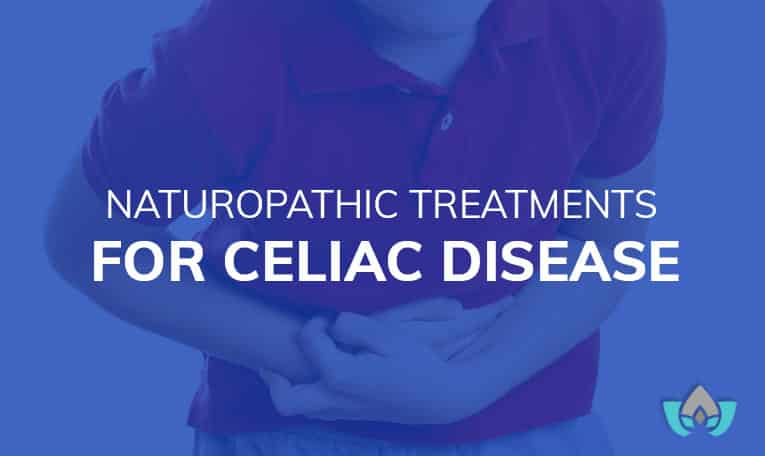 Celiac disease existed for thousands of years before researchers discovered gluten was the culprit.
Nowadays, we know much more about what causes celiac disease and how to best treat it.
Due to its myriad of symptoms and the fact that gluten is in so many foods we often consume, celiac disease can be difficult to diagnose.
In fact it is often left undiagnosed, which can lead to problematic long-term health issues affecting not only your digestive system but also your skin, joints, and bones.
Thankfully, there are natural ways to treat the uncomfortable and often painful symptoms of celiac disease and help improve your quality of life.
If you have celiac disease or you believe you may be experiencing related symptoms, a digestive health naturopathic doctor
will be able to help you investigate natural solutions.
In the meantime, let's look into the details of what celiac disease is.
What Is Celiac Disease
Celiac disease is an auto-immune reaction to the consumption of gluten, which is a protein found in wheat, rye, and barley.
The immune reaction is triggered in your small intestine, which can cause disastrous problems over time if left untreated.
Most statistics put celiac disease as affecting less than 1% of all adults, though many cases are thought to be undiagnosed.
Researchers from the University
of Chicago estimate that approximately 15-17% of celiac cases are known and diagnosed in America alone, meaning that the majority of individuals with celiac disease do not know they
have it.
But what actually happens inside of your body when you have celiac disease?
If you have celiac disease and you consume gluten, your digestive system sets off an alarm, to which your immune system immediately responds.
When your body interacts with gliadin, one of the compounds in the gluten protein, your antibody levels will rise and your body will releasecytokine chemicals.
Usually, cytokines are a good thing.
When they are functioning properly, they help your body heal and protect against harmful infections and injuries.
However, cytokines can also cause problematic inflammation, which is related to a myriad of health issues.
But how do you know if your health issues are due to a gluten intolerance, or something more?
Let's delve into the various signs and symptoms indicative of celiac disease.
Symptoms Of Celiac Disease
Celiac disease can manifest itself in many different symptoms, and they are different in adults and children.
However, the most common symptoms for adults with celiac disease are related to the digestive system.
The most prevalent include diarrhea, constipation, fatigue, and weight loss; other common digestive symptoms include abdominal pain, nausea and/or vomiting, and malnutrition due to
improper gut absorption.
There are also many symptoms of celiac disease that are not centred around the digestive system.
These symptoms include:
-Sudden weight change
-Joint pain
-Anemia and iron deficiency
-Osteoporosis (bone density loss) or osteomalacia (bone softening)
-Canker sores/mouth ulcers
-Numbness/tingling in hands and feet
-Acid reflux and heartburn
-Itchy skin rash (dermatitis herpetiformis)
The symptoms of celiac disease can be very different in children.
Younger children (under 2 years old) with celiac disease typically experience vomiting, diarrhea, poor appetite, failure to thrive, and a swollen belly.
Children older than 2 may experience some similar symptoms, such as diarrhea, constipation, and weight loss, but they may also have a short stature, delayed puberty, and various
neurological symptoms.
These neurological symptoms include irritability, ADHD (attention-deficit/hyperactivity disorder), headaches/migraines, or learning disabilities.
Celiac disease can manifest in many various ways and can be mistaken for many other digestive and health issues, which is a major factor in making it difficult to diagnose.
Causes And Risk Factors For Celiac Disease
Unfortunately for those dealing with celiac disease, the exact cause is unknown.
Celiac disease can be triggered by an intense emotional experience during pregnancy or childbirth, or a traumatic physical and emotional event, such as surgery or severe stress.
Although some gene variations appear to increase your risk of developing celiac disease, it is not necessarily a genetic condition.
For example, if someone in your family has celiac disease, you will not necessarily have it as well.
This proves additional factors must be involved in the causation of celiac disease.
Is Celiac Disease And Gluten Intolerance The Same Thing?
Although there are similarities between those who suffer from celiac disease and those who have a gluten intolerance, there are key differences between the two.
Gluten intolerances lie on a spectrum from mild to more serious symptoms and reactions, even among those who have celiac disease.
It is possible to have non-celiac gluten sensitivity, and some researchers theorize that many people have this condition without knowing.
You can have trouble digesting gluten without being clinically allergic to it, meaning your celiac disease tests are negative and you don't show specific signs of gluten intolerance.
Naturopathic Treatments For Celiac Disease
If you're suffering from celiac disease and looking for a natural way to treat your symptoms, there are naturopathic solutions that may bring you necessary relief.
Unfortunately, there is no cure for celiac disease as it is a chronic autoimmune disease, but there are natural ways to mitigate your symptoms.
Celiac disease existed for thousands of years before researchers discovered gluten was the culprit.
Nowadays, we know much more about what causes celiac disease and how to best treat it.
Due to its myriad of symptoms and the fact that gluten is in so many foods we often consume, celiac disease can be difficult to diagnose.
In fact it is often left undiagnosed, which can lead to problematic long-term health issues affecting not only your digestive system but also your skin, joints, and bones.
Thankfully, there are natural ways to treat the uncomfortable and often painful symptoms of celiac disease and help improve your quality of life.
If you have celiac disease or you believe you may be experiencing related symptoms, a digestive health naturopathic doctor
will be able to help you investigate natural solutions.
In the meantime, let's look into the details of what celiac disease is.
What Is Celiac Disease
Celiac disease is an auto-immune reaction to the consumption of gluten, which is a protein found in wheat, rye, and barley.
The immune reaction is triggered in your small intestine, which can cause disastrous problems over time if left untreated.
Most statistics put celiac disease as affecting less than 1% of all adults, though many cases are thought to be undiagnosed.
Researchers from the University
of Chicago estimate that approximately 15-17% of celiac cases are known and diagnosed in America alone, meaning that the majority of individuals with celiac disease do not know they
have it.
But what actually happens inside of your body when you have celiac disease?
If you have celiac disease and you consume gluten, your digestive system sets off an alarm, to which your immune system immediately responds.
When your body interacts with gliadin, one of the compounds in the gluten protein, your antibody levels will rise and your body will releasecytokine chemicals.
Usually, cytokines are a good thing.
When they are functioning properly, they help your body heal and protect against harmful infections and injuries.
However, cytokines can also cause problematic inflammation, which is related to a myriad of health issues.
But how do you know if your health issues are due to a gluten intolerance, or something more?
Let's delve into the various signs and symptoms indicative of celiac disease.
Symptoms Of Celiac Disease
Celiac disease can manifest itself in many different symptoms, and they are different in adults and children.
However, the most common symptoms for adults with celiac disease are related to the digestive system.
The most prevalent include diarrhea, constipation, fatigue, and weight loss; other common digestive symptoms include abdominal pain, nausea and/or vomiting, and malnutrition due to
improper gut absorption.
There are also many symptoms of celiac disease that are not centred around the digestive system.
These symptoms include:
-Sudden weight change
-Joint pain
-Anemia and iron deficiency
-Osteoporosis (bone density loss) or osteomalacia (bone softening)
-Canker sores/mouth ulcers
-Numbness/tingling in hands and feet
-Acid reflux and heartburn
-Itchy skin rash (dermatitis herpetiformis)
The symptoms of celiac disease can be very different in children.
Younger children (under 2 years old) with celiac disease typically experience vomiting, diarrhea, poor appetite, failure to thrive, and a swollen belly.
Children older than 2 may experience some similar symptoms, such as diarrhea, constipation, and weight loss, but they may also have a short stature, delayed puberty, and various
neurological symptoms.
These neurological symptoms include irritability, ADHD (attention-deficit/hyperactivity disorder), headaches/migraines, or learning disabilities.
Celiac disease can manifest in many various ways and can be mistaken for many other digestive and health issues, which is a major factor in making it difficult to diagnose.
Causes And Risk Factors For Celiac Disease
Unfortunately for those dealing with celiac disease, the exact cause is unknown.
Celiac disease can be triggered by an intense emotional experience during pregnancy or childbirth, or a traumatic physical and emotional event, such as surgery or severe stress.
Although some gene variations appear to increase your risk of developing celiac disease, it is not necessarily a genetic condition.
For example, if someone in your family has celiac disease, you will not necessarily have it as well.
This proves additional factors must be involved in the causation of celiac disease.
Is Celiac Disease And Gluten Intolerance The Same Thing?
Although there are similarities between those who suffer from celiac disease and those who have a gluten intolerance, there are key differences between the two.
Gluten intolerances lie on a spectrum from mild to more serious symptoms and reactions, even among those who have celiac disease.
It is possible to have non-celiac gluten sensitivity, and some researchers theorize that many people have this condition without knowing.
You can have trouble digesting gluten without being clinically allergic to it, meaning your celiac disease tests are negative and you don't show specific signs of gluten intolerance.
Naturopathic Treatments For Celiac Disease
If you're suffering from celiac disease and looking for a natural way to treat your symptoms, there are naturopathic solutions that may bring you necessary relief.
Unfortunately, there is no cure for celiac disease as it is a chronic autoimmune disease, but there are natural ways to mitigate your symptoms.
 1. Follow A Gluten Free Diet
Eating gluten-free foods is a crucial step towards living and coping with celiac disease.
Not only wheat products contain gluten – wheat, barley, and rye contain proteins comprised of 80% gluten, and other grains may contain hidden gluten.
Many packaged foods may contain gluten, even if it doesn't seem like they do – be sure to check the ingredient label when purchasing these kinds of products.
This is due to how foods are processed nowadays, which leaves many packaged goods containing trace amounts of gluten.
You can consult with a naturopath to ensure which foods are entirely gluten-free and safe for you to consume.
These days, there are multitudes of nutritious (and often delicious) gluten-free options to choose from.
2. Deal With Nutrient Deficiencies
The unfortunate consequence of malabsorption is that your body lacks important nutrients such as iron, calcium, zinc, and various vitamins.
These vitamins and minerals just don't get absorbed properly by your gut, which makes nutrient deficiencies a common issue for those dealing with celiac disease.
After getting tested for suspected deficiencies, we can help you find which dietary supplements will help restore your nutrients to their proper levels.
Many packaged wheat products are enriched with various nutrients, while gluten-free products are often not.
Supplements and nutrient-dense foods are very important to include in your diet and lifestyle.
3. Check For Other Damage To Your Skin, Bones, or Digestive System
Many different parts of your body can suffer from celiac disease, from your bones to your skin.
Tests such as a bone density can be performed to ensure you are not experiencing bone loss or joint issues such as inflammation.
Skin rashes can be an uncomfortable symptom to deal with, so getting your skin tested for potential disorders such as dermatitis herpetiformis can help you find relief.
There are also tests that can be done to ensure your digestive system isn't suffering more than it should.
Leaky gut syndrome can be painful and cause further damage, and unfortunately it often appears in those with celiac disease.
Thankfully, there are tests that can keep you in the know on what's going on in your digestive system.
Call The Mindful Healing Clinic
If you're living with celiac disease and want better ways to manage your symptoms, you don't have to suffer in silence.
There are natural remedies that can help improve your gut health and make your body's reactions to gluten more manageable.
Alternatively, if you're reading this and suspect you may be dealing with celiac disease, we can help.
Contact us at the Mindful Healing Clinic for a free consultation.
We can look at your individual health concerns and work together on a treatment plan to help your body heal, and get you feeling your best.
Book your free health and wellness session at The Mindful Healing Clinic today.
The post Naturopathic Treatments For Celiac Disease appeared first on Mindful Healing.
1. Follow A Gluten Free Diet
Eating gluten-free foods is a crucial step towards living and coping with celiac disease.
Not only wheat products contain gluten – wheat, barley, and rye contain proteins comprised of 80% gluten, and other grains may contain hidden gluten.
Many packaged foods may contain gluten, even if it doesn't seem like they do – be sure to check the ingredient label when purchasing these kinds of products.
This is due to how foods are processed nowadays, which leaves many packaged goods containing trace amounts of gluten.
You can consult with a naturopath to ensure which foods are entirely gluten-free and safe for you to consume.
These days, there are multitudes of nutritious (and often delicious) gluten-free options to choose from.
2. Deal With Nutrient Deficiencies
The unfortunate consequence of malabsorption is that your body lacks important nutrients such as iron, calcium, zinc, and various vitamins.
These vitamins and minerals just don't get absorbed properly by your gut, which makes nutrient deficiencies a common issue for those dealing with celiac disease.
After getting tested for suspected deficiencies, we can help you find which dietary supplements will help restore your nutrients to their proper levels.
Many packaged wheat products are enriched with various nutrients, while gluten-free products are often not.
Supplements and nutrient-dense foods are very important to include in your diet and lifestyle.
3. Check For Other Damage To Your Skin, Bones, or Digestive System
Many different parts of your body can suffer from celiac disease, from your bones to your skin.
Tests such as a bone density can be performed to ensure you are not experiencing bone loss or joint issues such as inflammation.
Skin rashes can be an uncomfortable symptom to deal with, so getting your skin tested for potential disorders such as dermatitis herpetiformis can help you find relief.
There are also tests that can be done to ensure your digestive system isn't suffering more than it should.
Leaky gut syndrome can be painful and cause further damage, and unfortunately it often appears in those with celiac disease.
Thankfully, there are tests that can keep you in the know on what's going on in your digestive system.
Call The Mindful Healing Clinic
If you're living with celiac disease and want better ways to manage your symptoms, you don't have to suffer in silence.
There are natural remedies that can help improve your gut health and make your body's reactions to gluten more manageable.
Alternatively, if you're reading this and suspect you may be dealing with celiac disease, we can help.
Contact us at the Mindful Healing Clinic for a free consultation.
We can look at your individual health concerns and work together on a treatment plan to help your body heal, and get you feeling your best.
Book your free health and wellness session at The Mindful Healing Clinic today.
The post Naturopathic Treatments For Celiac Disease appeared first on Mindful Healing.
>> Read More
Vitamin Profile: Vitamin B1 (Sun, 06 Jan 2019)
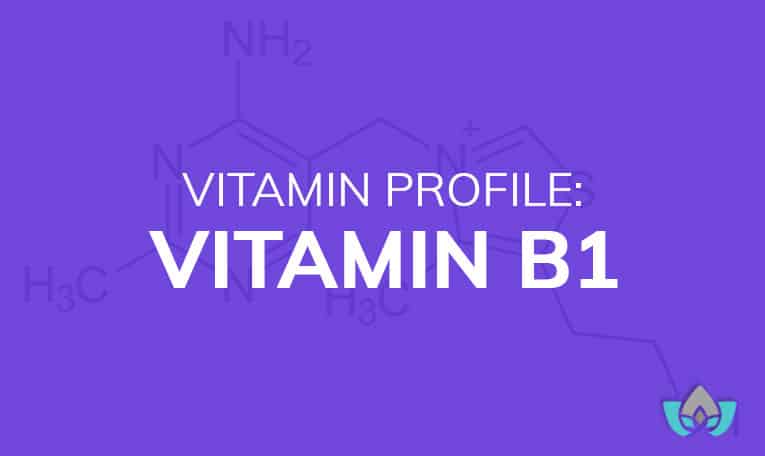 Although the B-vitamins are often grouped together, because they are generally found in the same foods, there are great benefits to each of them individually as well.
Depending on what symptoms you are facing, and what areas you are looking for assistance with, supplementing with specific B-vitamins, rather than a B-complex, may sometimes be
beneficial.
Vitamin B1, for example, can be used for relief from painful menstruation and to increase energy in people suffering
from hypothyroidism.
Let's have a deeper look at vitamin B1, and how it may be used.
What Is Vitamin B1?
Vitamin B1, also called Thiamine, is used by the body to help process carbohydrates.
It plays an important role in nerve, muscle, and heart function.
It is water-soluble, so any excess B1 which the body is unable to use will be excreted in the urine, making it very difficult to ever have too much B1 in your system.
Benefits Of Vitamin B1
Vitamin B1 has many benefits.
As noted, it plays important roles in metabolism, nerve, and muscle function.
Let's take a closer look at some of these benefits.
1. Can Correct Metabolic Disorders
Taking thiamine supplements orally can help to correct metabolic disorders.
It has been shown effective for some genetic diseases, such as Leigh's disease, maple syrup urine disease, among others.
2. May Help With Cataracts
A cataract is a clouding of the lens of the eye, which is located behind the iris and pupil.
They are the most common cause of vision loss in people over the age of 40, and thus preventing them is important for overall vision health.
Thiamine deficiency may result in blurred vision due to swelling of the optic nerve.
There have been links to a high thiamine diet and a reduced risk of developing cataracts.
3. May Relieve Painful Menstruation
There is some research to suggest that taking thiamine supplements for 90 days may stop or reduce pain associated with menstruation between 12 and 21 years of age.
4. May Be Deficient in People Suffering From Hypothyroidism
Fatigue associated with thyroid problems may be linked to a Thiamine deficiency in these patients, thus supplementing them with it may improve energy levels.
Although the B-vitamins are often grouped together, because they are generally found in the same foods, there are great benefits to each of them individually as well.
Depending on what symptoms you are facing, and what areas you are looking for assistance with, supplementing with specific B-vitamins, rather than a B-complex, may sometimes be
beneficial.
Vitamin B1, for example, can be used for relief from painful menstruation and to increase energy in people suffering
from hypothyroidism.
Let's have a deeper look at vitamin B1, and how it may be used.
What Is Vitamin B1?
Vitamin B1, also called Thiamine, is used by the body to help process carbohydrates.
It plays an important role in nerve, muscle, and heart function.
It is water-soluble, so any excess B1 which the body is unable to use will be excreted in the urine, making it very difficult to ever have too much B1 in your system.
Benefits Of Vitamin B1
Vitamin B1 has many benefits.
As noted, it plays important roles in metabolism, nerve, and muscle function.
Let's take a closer look at some of these benefits.
1. Can Correct Metabolic Disorders
Taking thiamine supplements orally can help to correct metabolic disorders.
It has been shown effective for some genetic diseases, such as Leigh's disease, maple syrup urine disease, among others.
2. May Help With Cataracts
A cataract is a clouding of the lens of the eye, which is located behind the iris and pupil.
They are the most common cause of vision loss in people over the age of 40, and thus preventing them is important for overall vision health.
Thiamine deficiency may result in blurred vision due to swelling of the optic nerve.
There have been links to a high thiamine diet and a reduced risk of developing cataracts.
3. May Relieve Painful Menstruation
There is some research to suggest that taking thiamine supplements for 90 days may stop or reduce pain associated with menstruation between 12 and 21 years of age.
4. May Be Deficient in People Suffering From Hypothyroidism
Fatigue associated with thyroid problems may be linked to a Thiamine deficiency in these patients, thus supplementing them with it may improve energy levels.
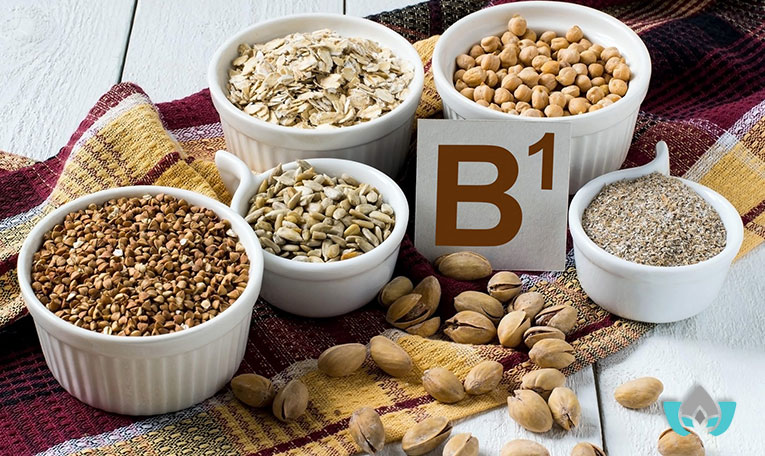 Symptoms of Vitamin B1 Deficiency
There are a number of undesirable symptoms which can occur when an individual has a vitamin B1 deficiency.
Here we will take a look at some of these symptoms.
1. Irritability
Feeling irritable, agitated, and frustrated is often one of the first symptoms of a thiamine deficiency.
It may begin to show as early as days of becoming deficient, or after a few weeks.
It has been especially linked to infants with beriberi, which is a disease caused by thiamine deficiency.
2. Loss of Appetite
Scientists believe thiamine helps to control the “satiety centre” in the hypothalamus of the brain.
This is what causes the body to feel full, and when there is thiamine deficiency it can cause the body to feel full even when it is not, leading to a loss of appetite.
3. Reduced Reflexes
As previously stated, thiamine plays a role in nerve function.
This damage to the nervous system can cause reduced or absent reflexes of the knee, ankle, and triceps.
As the deficiency progresses, it may affect coordination and ability to walk.
4. Muscle Weakness
There can be many reasons for muscle weakness, and the cause is not always immediately known.
Persistent, long-term muscle weakness may be a symptom of thiamine deficiency.
If you are experiencing unexplained muscle weakness, looking at if you are getting enough thiamine might be something to consider.
5. Nausea And Vomiting
Gastrointestinal symptoms are not as common as the other symptoms of thiamine deficiency, however in some cases nausea and vomiting may result.
The reason for these symptoms is not clearly understood, however it seems to be more common in infants with thiamine deficiency.
Call The Mindful Healing Clinic
Are you worried about vitamin B1 deficiency?
Are you experiencing any of the symptoms listed above, but can't pinpoint the cause?
Contact me, Dr. Maria, at the Mindful Healing Clinic to book an appointment today.
If you've never been here before, or if you're new to naturopathic medicine and want to find out more, I offer a FREE 15-minute introductory session.
During that session, you and I will sit down and talk about your health concerns. I'll answer any questions you may have, and from there we can talk about what your options are.
Some of the above symptoms have been linked with multiple different disorders, so their presence doesn't necessarily mean you're deficient in vitamin B1. However, it's still a good idea
to see a professional so you can pinpoint the cause.
Contact us at the Mindful Healing Clinic today.
The post Vitamin Profile: Vitamin B1 appeared first on Mindful Healing.
Symptoms of Vitamin B1 Deficiency
There are a number of undesirable symptoms which can occur when an individual has a vitamin B1 deficiency.
Here we will take a look at some of these symptoms.
1. Irritability
Feeling irritable, agitated, and frustrated is often one of the first symptoms of a thiamine deficiency.
It may begin to show as early as days of becoming deficient, or after a few weeks.
It has been especially linked to infants with beriberi, which is a disease caused by thiamine deficiency.
2. Loss of Appetite
Scientists believe thiamine helps to control the “satiety centre” in the hypothalamus of the brain.
This is what causes the body to feel full, and when there is thiamine deficiency it can cause the body to feel full even when it is not, leading to a loss of appetite.
3. Reduced Reflexes
As previously stated, thiamine plays a role in nerve function.
This damage to the nervous system can cause reduced or absent reflexes of the knee, ankle, and triceps.
As the deficiency progresses, it may affect coordination and ability to walk.
4. Muscle Weakness
There can be many reasons for muscle weakness, and the cause is not always immediately known.
Persistent, long-term muscle weakness may be a symptom of thiamine deficiency.
If you are experiencing unexplained muscle weakness, looking at if you are getting enough thiamine might be something to consider.
5. Nausea And Vomiting
Gastrointestinal symptoms are not as common as the other symptoms of thiamine deficiency, however in some cases nausea and vomiting may result.
The reason for these symptoms is not clearly understood, however it seems to be more common in infants with thiamine deficiency.
Call The Mindful Healing Clinic
Are you worried about vitamin B1 deficiency?
Are you experiencing any of the symptoms listed above, but can't pinpoint the cause?
Contact me, Dr. Maria, at the Mindful Healing Clinic to book an appointment today.
If you've never been here before, or if you're new to naturopathic medicine and want to find out more, I offer a FREE 15-minute introductory session.
During that session, you and I will sit down and talk about your health concerns. I'll answer any questions you may have, and from there we can talk about what your options are.
Some of the above symptoms have been linked with multiple different disorders, so their presence doesn't necessarily mean you're deficient in vitamin B1. However, it's still a good idea
to see a professional so you can pinpoint the cause.
Contact us at the Mindful Healing Clinic today.
The post Vitamin Profile: Vitamin B1 appeared first on Mindful Healing.
>> Read More
Naturopathic Treatment For Depression In Adults (Sun, 30 Dec 2018)
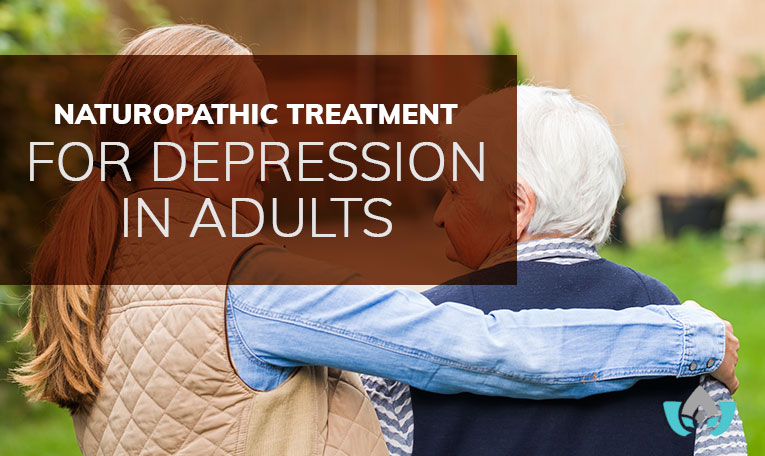 If you keep up with the news, you will have heard about several recent celebrity deaths due to suicide, such as Avicii, Kate Spade and Anthony Bourdain, all of whom struggled with
depression.
Depression is an important topic, and it's why we've talked about mental health before, and will continue
to highlight the symptoms and how it can be treated.
Let's talk about what depression is, where it comes from, and most importantly, what you can do about it when it hits.
What Is Depression?
Depression is a medical condition that affects 1 in 4 Canadians at some point in their lives, enough that they need to seek treatment.
Depression is similar to sadness or grief, but it persists for weeks or months, possibly with no explanation or reason.
Some people will experience it once, and others will have it recur chronically over their lives and struggle to deal with it.
Types Of Depression
Doctors use a manual called the DSM-5 to diagnose mental disorders, as these different types of depression often need different treatment.
There are three primary types: major depressive disorder, dysthymia and bipolar disorder.
Major depressive disorder is quite debilitating; those who suffer are unable to feel pleasure, and experience constant feelings of hopelessness, guilt and worthlessness.
Dysthymia, also known as depressive neurosis or persistent depressive disorder, is depression which lasts for longer than two years.
While it is milder than major depressive disorder, it can persist for longer, and sometimes these patients experience 'double depression', meaning they already have dysthymia when they
also develop major depressive order on top of it.
Bipolar disorder, which was once referred to manic depression, is so called because these patients experience both highs and lows.
By turns, they experience the symptoms of major depressive disorder, then will become excited, need little sleep, and have loads of energy for social, physical and sexual activity.
While the manic episode may occur to people as normal, often times manic people feel superhuman, and have skewed perceptions of safety, occasionally harming themselves through their sheer
exuberance.
Other than these three examples, there also exits substance-induced mood disorder (experienced while taking a drug or after ceasing drugs), premenstrual dysphoric disorder, and disruptive
mood dysregulation disorder (suffered by children and especially teens).
Symptoms Of Depression
The following list is an overview, but is certainly not an exclusive representation of the symptoms of depression:
• Sadness that persists most of the day or longer than a few days
• Loss of enjoyment for things that once were pleasurable
• Insomnia or excessive sleeping
• Fatigue, tiredness, or feeling permanently exhausted
• Problems with concentration, making decisions, or memory
• Weight gain or weight loss
• Feelings of hopelessness or worthlessness
• Paralyzing guilt that can make people want to punish themselves
• Thoughts of death or suicide, suicidal ideation
The Brain-Gut Connection
There has been increasing attention paid to how gastrointestinal conditions
can cause or affect diseases that are non-gastro in nature.
One example is how dysbiosis – a microbial imbalance in the gut – seems to be a factor in mental health illnesses such as anxiety and depression.
Probiotics are effective in restoring that microbial balance, and are being studied for their ability to affect not just anxiety and depression, but schizophrenia and autism.
Inflammation is also a factor in a healthy gut and healthy brain; when the GI tract is inflamed, it places stress on the microbiome, which releases cytokines and neruotransmitters.
The study in the link above did establish that pro-inflammatory cytokines play a direct role in the development of mental illnesses.
Naturopathic Treatments For Depression
There are several different types of pharmaceuticals, and certainly conventional medicine can usually find the right dosage and combination of drugs that effectively manage symptoms of
depression, no matter what those may be for any person.
However, for those interested in pursuing more of a natural course of action, here are six natural ways to fight depression.
1. Eat An Anti-Inflammatory Diet
Due to the links between inflammation and mental health, along with recommending you eat a balanced diet, I recommend you also focus on adding more anti-inflammatory foods.
Turmeric is a tried and true option that you can add as a spice to your foods, or you can whip up in a hot cup of golden tea.
Surprise, surprise: leafy greens are also on the list of anti-inflammatory foods…so nosh away on that kale, spinach or some collard greens.
There are several fatty foods that qualify for this list, too: olive oil, almonds and walnuts, and fish such as salmon, tuna, sardines and mackerel.
For snacks, fruits such as cherries, oranges, blueberries or strawberries will help to keep down the inflammation.
If you keep up with the news, you will have heard about several recent celebrity deaths due to suicide, such as Avicii, Kate Spade and Anthony Bourdain, all of whom struggled with
depression.
Depression is an important topic, and it's why we've talked about mental health before, and will continue
to highlight the symptoms and how it can be treated.
Let's talk about what depression is, where it comes from, and most importantly, what you can do about it when it hits.
What Is Depression?
Depression is a medical condition that affects 1 in 4 Canadians at some point in their lives, enough that they need to seek treatment.
Depression is similar to sadness or grief, but it persists for weeks or months, possibly with no explanation or reason.
Some people will experience it once, and others will have it recur chronically over their lives and struggle to deal with it.
Types Of Depression
Doctors use a manual called the DSM-5 to diagnose mental disorders, as these different types of depression often need different treatment.
There are three primary types: major depressive disorder, dysthymia and bipolar disorder.
Major depressive disorder is quite debilitating; those who suffer are unable to feel pleasure, and experience constant feelings of hopelessness, guilt and worthlessness.
Dysthymia, also known as depressive neurosis or persistent depressive disorder, is depression which lasts for longer than two years.
While it is milder than major depressive disorder, it can persist for longer, and sometimes these patients experience 'double depression', meaning they already have dysthymia when they
also develop major depressive order on top of it.
Bipolar disorder, which was once referred to manic depression, is so called because these patients experience both highs and lows.
By turns, they experience the symptoms of major depressive disorder, then will become excited, need little sleep, and have loads of energy for social, physical and sexual activity.
While the manic episode may occur to people as normal, often times manic people feel superhuman, and have skewed perceptions of safety, occasionally harming themselves through their sheer
exuberance.
Other than these three examples, there also exits substance-induced mood disorder (experienced while taking a drug or after ceasing drugs), premenstrual dysphoric disorder, and disruptive
mood dysregulation disorder (suffered by children and especially teens).
Symptoms Of Depression
The following list is an overview, but is certainly not an exclusive representation of the symptoms of depression:
• Sadness that persists most of the day or longer than a few days
• Loss of enjoyment for things that once were pleasurable
• Insomnia or excessive sleeping
• Fatigue, tiredness, or feeling permanently exhausted
• Problems with concentration, making decisions, or memory
• Weight gain or weight loss
• Feelings of hopelessness or worthlessness
• Paralyzing guilt that can make people want to punish themselves
• Thoughts of death or suicide, suicidal ideation
The Brain-Gut Connection
There has been increasing attention paid to how gastrointestinal conditions
can cause or affect diseases that are non-gastro in nature.
One example is how dysbiosis – a microbial imbalance in the gut – seems to be a factor in mental health illnesses such as anxiety and depression.
Probiotics are effective in restoring that microbial balance, and are being studied for their ability to affect not just anxiety and depression, but schizophrenia and autism.
Inflammation is also a factor in a healthy gut and healthy brain; when the GI tract is inflamed, it places stress on the microbiome, which releases cytokines and neruotransmitters.
The study in the link above did establish that pro-inflammatory cytokines play a direct role in the development of mental illnesses.
Naturopathic Treatments For Depression
There are several different types of pharmaceuticals, and certainly conventional medicine can usually find the right dosage and combination of drugs that effectively manage symptoms of
depression, no matter what those may be for any person.
However, for those interested in pursuing more of a natural course of action, here are six natural ways to fight depression.
1. Eat An Anti-Inflammatory Diet
Due to the links between inflammation and mental health, along with recommending you eat a balanced diet, I recommend you also focus on adding more anti-inflammatory foods.
Turmeric is a tried and true option that you can add as a spice to your foods, or you can whip up in a hot cup of golden tea.
Surprise, surprise: leafy greens are also on the list of anti-inflammatory foods…so nosh away on that kale, spinach or some collard greens.
There are several fatty foods that qualify for this list, too: olive oil, almonds and walnuts, and fish such as salmon, tuna, sardines and mackerel.
For snacks, fruits such as cherries, oranges, blueberries or strawberries will help to keep down the inflammation.
 2. Encourage Friendly Bacterial Growth
As discussed above, the condition of your microbiome can have an impact on your mental health, and are often called 'psychobiotics' to reflect that connection.
To increase the probiotics you're consuming, look to kimchi, kefir, yogurt, kombucha, and sauerkraut, as these will help reduce inflammation.
As well, consider prebiotics, which are helpful in nurturing good bacteria; these include garlic, onions, leeks, dandelion greens, and Jerusalem artichokes.
3. Get Some Exercise
Exercise helps your whole cardiovascular system, but it also soothes your soul.
When you're feeling blue, the best thing you can do is fit in a yoga class, a high intensity workout or a walk.
Exercise reduces cortisol levels and increases serotonin – this serves to reduce stress levels and lift your mood.
Joining others in a workout or dropping in at a neighbourhood gym will also get you out of the house and connected with people, which are both important steps for people suffering from
major depressive disorder.
4. Address Any Nutrient Deficiencies
Once again, a blood test can tell us a lot about what you might be missing that could be contributing to the severity of your mood imbalances.
Zinc is an excellent example, because it supports enzyme-enabled reactions, the development of neurological networks and communication.
Another vitamin to check on is B12, which is often referred to as the 'energy vitamin.'
Some of the symptoms of B12 deficiency are the same as depression, so it can be hard to tell where one ends and the other begins.
However, because it helps with symptoms such as fatigue, confusion, weakness and difficulty concentrating, it can be leveraged to alleviate those symptoms of depression.
Vitamin D deficiency has also been connected with depression. Speaking of which…
5. Supplement With Vitamin D
Vitamin D has been a go-to for many years for both infants who can't go in the sun, as well as adults who suffer from seasonal affective disorder.
Vitamin D is associated with sunshine, and during the winter or a particularly grey stretch of time, people often feel lethargic, irritable and moody.
These symptoms are similar to depression, so you may need to take vitamin D more regularly, but after a short while, you should feel some alleviation of your symptoms.
6. Supplement With Omega-3
Although more studies are needed, the links to omega-3 helping with depression are generally accepted, and research so far shows improvement in symptoms when omega-3 is supplemented for
approximately 8 weeks.
You can either take this fatty acid as a capsule, or you can incorporate more enriched eggs or orange juice, ground flax, and fish into your diet.
Contact The Mindful Healing Clinic
As a naturopathic doctor, I see many people who suffer from depression and anxiety, and who are finding it hard to get the support they need through conventional medicine channels.
One of the great features of an ND is that we spend more time with our patients than a family doctor, so we're able to identify possible triggers to conditions and symptoms to offer
treatment foryour individual case.
If you feel like you suffer from any of the symptoms above, I encourage you to call now to book your free assessment with me, and let me help you with a healing plan for your pain.
The post Naturopathic Treatment For Depression In Adults appeared first on Mindful Healing.
2. Encourage Friendly Bacterial Growth
As discussed above, the condition of your microbiome can have an impact on your mental health, and are often called 'psychobiotics' to reflect that connection.
To increase the probiotics you're consuming, look to kimchi, kefir, yogurt, kombucha, and sauerkraut, as these will help reduce inflammation.
As well, consider prebiotics, which are helpful in nurturing good bacteria; these include garlic, onions, leeks, dandelion greens, and Jerusalem artichokes.
3. Get Some Exercise
Exercise helps your whole cardiovascular system, but it also soothes your soul.
When you're feeling blue, the best thing you can do is fit in a yoga class, a high intensity workout or a walk.
Exercise reduces cortisol levels and increases serotonin – this serves to reduce stress levels and lift your mood.
Joining others in a workout or dropping in at a neighbourhood gym will also get you out of the house and connected with people, which are both important steps for people suffering from
major depressive disorder.
4. Address Any Nutrient Deficiencies
Once again, a blood test can tell us a lot about what you might be missing that could be contributing to the severity of your mood imbalances.
Zinc is an excellent example, because it supports enzyme-enabled reactions, the development of neurological networks and communication.
Another vitamin to check on is B12, which is often referred to as the 'energy vitamin.'
Some of the symptoms of B12 deficiency are the same as depression, so it can be hard to tell where one ends and the other begins.
However, because it helps with symptoms such as fatigue, confusion, weakness and difficulty concentrating, it can be leveraged to alleviate those symptoms of depression.
Vitamin D deficiency has also been connected with depression. Speaking of which…
5. Supplement With Vitamin D
Vitamin D has been a go-to for many years for both infants who can't go in the sun, as well as adults who suffer from seasonal affective disorder.
Vitamin D is associated with sunshine, and during the winter or a particularly grey stretch of time, people often feel lethargic, irritable and moody.
These symptoms are similar to depression, so you may need to take vitamin D more regularly, but after a short while, you should feel some alleviation of your symptoms.
6. Supplement With Omega-3
Although more studies are needed, the links to omega-3 helping with depression are generally accepted, and research so far shows improvement in symptoms when omega-3 is supplemented for
approximately 8 weeks.
You can either take this fatty acid as a capsule, or you can incorporate more enriched eggs or orange juice, ground flax, and fish into your diet.
Contact The Mindful Healing Clinic
As a naturopathic doctor, I see many people who suffer from depression and anxiety, and who are finding it hard to get the support they need through conventional medicine channels.
One of the great features of an ND is that we spend more time with our patients than a family doctor, so we're able to identify possible triggers to conditions and symptoms to offer
treatment foryour individual case.
If you feel like you suffer from any of the symptoms above, I encourage you to call now to book your free assessment with me, and let me help you with a healing plan for your pain.
The post Naturopathic Treatment For Depression In Adults appeared first on Mindful Healing.
>> Read More
Health Benefits Of Cinnamon (Sun, 11 Nov 2018)
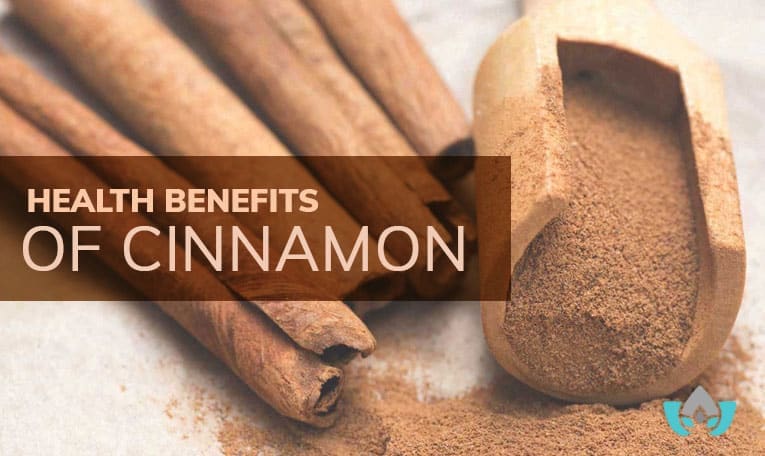 Of all the natural dietary ideas that we have in our arsenal to keep you well, cinnamon is probably one of the most delicious.
A valuable spice, traded as far back as 2000 BC, it was long recognized for its medicinal capacities, and even used to treat sore throats and arthritis in the middle ages.
Now that fall is here and winter isn't too far around the corner, you might find yourself enjoying some cinnamon flavoured foods.
Let's talk about this popular spice and what it can do for your health.
What Is Cinnamon?
Cinnamon is a spice derived from a tree bark; Cinnamomum trees can be found in the Caribbean, South America and Southeast Asia.
The stems or bark are removed from the tree, and the inner bark is left to dry before being ground into a powder, which is what you buy at the store for your baklava.
However, you can also use essential oil or extracts, which contain the phenolic compounds, flavonoids and antioxidants that make it such a powerhouse.
Cinnamon's Active Ingredient: Cinnamaldehyde
Cinnamaldehyde is the active compound found in the oily part of cinnamon sticks – the oil is what gives cinnamon its smell and flavor.
Cinnamaldehyde has many beneficial properties, such as:
• Antioxidant
• Anti-inflammatory
• Anti-diabetic
• Anti-microbial
• Protects against heart disease
• Boosts immunity
• Can protect against some cancers
Different Types Of Cinnamon
There are two different trees that produce cinnamon: Cinnamomum verum and Cinnamomum zeylanicum.
The first is Ceylon cinnamon, which is called “true cinnamon” – the latter is Cassia cinnamon, a more common and cheaper variety that is what is widely available is stores.
Cassia tends to be a darker brownish-red colour and a stronger, spicier flavour.
It's cheaper and easier to find, since it's far more commonly found around the world. It has far more cinnamaldehyde in its essential oil, giving it its stronger flavour.
Ceylon, on the other hand, is more tanned brown, and has a sweeter flavour.
It's far more expensive than its cousin, owing to its rarity. It has less cinnamaldehyde in its essential oil.
Research has been done on the health benefits of cinnamon, but not enough has been done on the difference between Cassia and Ceylon.
However, Cassia does have a far higher amount of coumarin, a naturally occurring substance in plants with known carcinogenic properties.
The daily recommended limit of coumarin intake is 0.1 mg/kg.
While you still need to eat a fair amount of Cassia to reach that limit, it's worth considering that if you're eating a lot of cinnamon you may want to consider switching to Ceylon.
Health Benefits Of Cinnamon
Cinnamon has such a wide variety of crucial nutrients, vitamins, and minerals - especially fiber and manganese - all in just one serving.
Manganese is important for normal brain and nerve function, but it also helps build healthy connective tissue and bones, and is linked to blood-clotting abilities, metabolism of fats and
carbohydrates, calcium absorption, blood sugar regulation and sex hormone production.
However, it has more important benefits, which we will look at below.
Of all the natural dietary ideas that we have in our arsenal to keep you well, cinnamon is probably one of the most delicious.
A valuable spice, traded as far back as 2000 BC, it was long recognized for its medicinal capacities, and even used to treat sore throats and arthritis in the middle ages.
Now that fall is here and winter isn't too far around the corner, you might find yourself enjoying some cinnamon flavoured foods.
Let's talk about this popular spice and what it can do for your health.
What Is Cinnamon?
Cinnamon is a spice derived from a tree bark; Cinnamomum trees can be found in the Caribbean, South America and Southeast Asia.
The stems or bark are removed from the tree, and the inner bark is left to dry before being ground into a powder, which is what you buy at the store for your baklava.
However, you can also use essential oil or extracts, which contain the phenolic compounds, flavonoids and antioxidants that make it such a powerhouse.
Cinnamon's Active Ingredient: Cinnamaldehyde
Cinnamaldehyde is the active compound found in the oily part of cinnamon sticks – the oil is what gives cinnamon its smell and flavor.
Cinnamaldehyde has many beneficial properties, such as:
• Antioxidant
• Anti-inflammatory
• Anti-diabetic
• Anti-microbial
• Protects against heart disease
• Boosts immunity
• Can protect against some cancers
Different Types Of Cinnamon
There are two different trees that produce cinnamon: Cinnamomum verum and Cinnamomum zeylanicum.
The first is Ceylon cinnamon, which is called “true cinnamon” – the latter is Cassia cinnamon, a more common and cheaper variety that is what is widely available is stores.
Cassia tends to be a darker brownish-red colour and a stronger, spicier flavour.
It's cheaper and easier to find, since it's far more commonly found around the world. It has far more cinnamaldehyde in its essential oil, giving it its stronger flavour.
Ceylon, on the other hand, is more tanned brown, and has a sweeter flavour.
It's far more expensive than its cousin, owing to its rarity. It has less cinnamaldehyde in its essential oil.
Research has been done on the health benefits of cinnamon, but not enough has been done on the difference between Cassia and Ceylon.
However, Cassia does have a far higher amount of coumarin, a naturally occurring substance in plants with known carcinogenic properties.
The daily recommended limit of coumarin intake is 0.1 mg/kg.
While you still need to eat a fair amount of Cassia to reach that limit, it's worth considering that if you're eating a lot of cinnamon you may want to consider switching to Ceylon.
Health Benefits Of Cinnamon
Cinnamon has such a wide variety of crucial nutrients, vitamins, and minerals - especially fiber and manganese - all in just one serving.
Manganese is important for normal brain and nerve function, but it also helps build healthy connective tissue and bones, and is linked to blood-clotting abilities, metabolism of fats and
carbohydrates, calcium absorption, blood sugar regulation and sex hormone production.
However, it has more important benefits, which we will look at below.
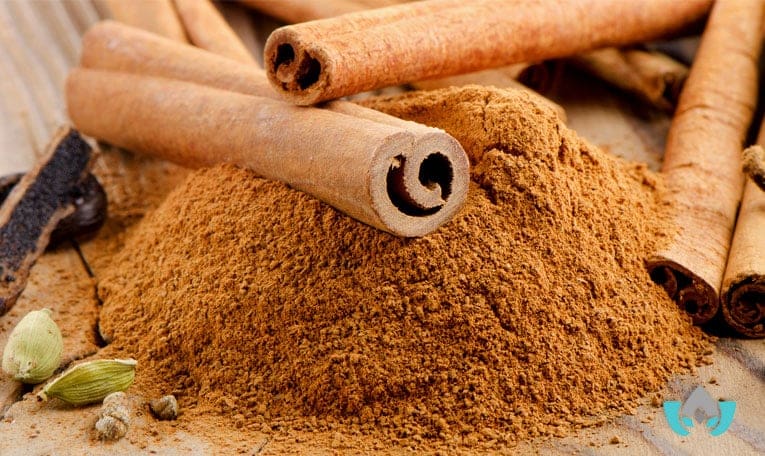 1. It Has Antioxidant Properties
An incredible antioxidant, it is so potent that it can even be used as a natural food preservative.
The polyphenols found in cinnamon protect your body from the damage of oxidative stress caused by free radicals.
2. It Reduces Insulin Resistance
Insulin is a hormone that regulates metabolism and energy, as well as helping transport blood sugar from your bloodstream to your cells.
Some people are resistant to insulin, which leads to type 2 diabetes and metabolic syndrome, but only 1-2 tsp of cinnamon can help manage this effectively, as shown in this 2008 study by RA Anderson.
3. It Reduces Blood Sugar Levels
As well as reducing insulin resistance, it also helps reduce blood sugar levels.
Cinnamon does two things very well: it decreases how much glucose enters your bloodstream after eating, and it also mimics insulin, allowing for far better glucose uptake by your cells.
By blocking digestive enzymes, it slows the absorption of sugar; making cinnamon supplements a good option for diabetics.
4. It May Have Anti-Cancer Properties
Excitingly, a 2007 study by Bhattacharjee, Rana, and Sengupta done on cinnamon and cardamom to
assess their anti-oxidative potential in fighting cancer (particularly colon cancer), shows that it does, in fact, help in two ways: by enhancing levels of the detoxifying enzymes, as
well as decreasing peroxidation levels.
Note, however, that this study was done on mice, and human trials are still needed in order to solidify that link, but with such a favourable forecast, many people are turning to cinnamon
to bolster their anti-cancer and cancer-recovery treatments.
5. It Has Anti-Inflammatory Properties
Inflammation is a culprit behind a great many conditions, including arthritis, depression, multiple sclerosis, and others.
Inflammation is helpful when it is fighting infections and repairing tissue damage, but it is a problem when it turns against your own body or becomes chronic.
Cinnamon can help reduce chronic inflammation, so it's only doing the good work it should.
Contact The Mindful Healing Clinic
With all the information on natural remedies and the health benefits of spices, herbs and food, it's hard to know, sometimes, what you should focus on.
That's where I can step in to help.
Call now to book your appointment at The Mindful Healing Clinic and let us help you sift through the data, applying what you need and discarding what you don't.
Every body's journey is different – let us help you find your way.
Until next time,
Dr. Maria Cavallazzi, N.D
Mindful Healing Integrative Naturopathy
251 Queen St S Unit 4,
Mississauga, ON L5M 1L7
- https://goo.gl/maps/KYspifT7J232
Dr. Maria Cavallazzi is a medical doctor from Colombia where she practiced as a family physician for 8 years until she moved to Canada 16 years ago.
To read additional info on health, wellness, and alternative medicine, please visit us here: naturopathy in downtown Mississauga
1. It Has Antioxidant Properties
An incredible antioxidant, it is so potent that it can even be used as a natural food preservative.
The polyphenols found in cinnamon protect your body from the damage of oxidative stress caused by free radicals.
2. It Reduces Insulin Resistance
Insulin is a hormone that regulates metabolism and energy, as well as helping transport blood sugar from your bloodstream to your cells.
Some people are resistant to insulin, which leads to type 2 diabetes and metabolic syndrome, but only 1-2 tsp of cinnamon can help manage this effectively, as shown in this 2008 study by RA Anderson.
3. It Reduces Blood Sugar Levels
As well as reducing insulin resistance, it also helps reduce blood sugar levels.
Cinnamon does two things very well: it decreases how much glucose enters your bloodstream after eating, and it also mimics insulin, allowing for far better glucose uptake by your cells.
By blocking digestive enzymes, it slows the absorption of sugar; making cinnamon supplements a good option for diabetics.
4. It May Have Anti-Cancer Properties
Excitingly, a 2007 study by Bhattacharjee, Rana, and Sengupta done on cinnamon and cardamom to
assess their anti-oxidative potential in fighting cancer (particularly colon cancer), shows that it does, in fact, help in two ways: by enhancing levels of the detoxifying enzymes, as
well as decreasing peroxidation levels.
Note, however, that this study was done on mice, and human trials are still needed in order to solidify that link, but with such a favourable forecast, many people are turning to cinnamon
to bolster their anti-cancer and cancer-recovery treatments.
5. It Has Anti-Inflammatory Properties
Inflammation is a culprit behind a great many conditions, including arthritis, depression, multiple sclerosis, and others.
Inflammation is helpful when it is fighting infections and repairing tissue damage, but it is a problem when it turns against your own body or becomes chronic.
Cinnamon can help reduce chronic inflammation, so it's only doing the good work it should.
Contact The Mindful Healing Clinic
With all the information on natural remedies and the health benefits of spices, herbs and food, it's hard to know, sometimes, what you should focus on.
That's where I can step in to help.
Call now to book your appointment at The Mindful Healing Clinic and let us help you sift through the data, applying what you need and discarding what you don't.
Every body's journey is different – let us help you find your way.
Until next time,
Dr. Maria Cavallazzi, N.D
Mindful Healing Integrative Naturopathy
251 Queen St S Unit 4,
Mississauga, ON L5M 1L7
- https://goo.gl/maps/KYspifT7J232
Dr. Maria Cavallazzi is a medical doctor from Colombia where she practiced as a family physician for 8 years until she moved to Canada 16 years ago.
To read additional info on health, wellness, and alternative medicine, please visit us here: naturopathy in downtown Mississauga
>> Read More
5 Ways Turmeric Can Help With PCOS Symptoms (Sun, 04 Nov 2018)
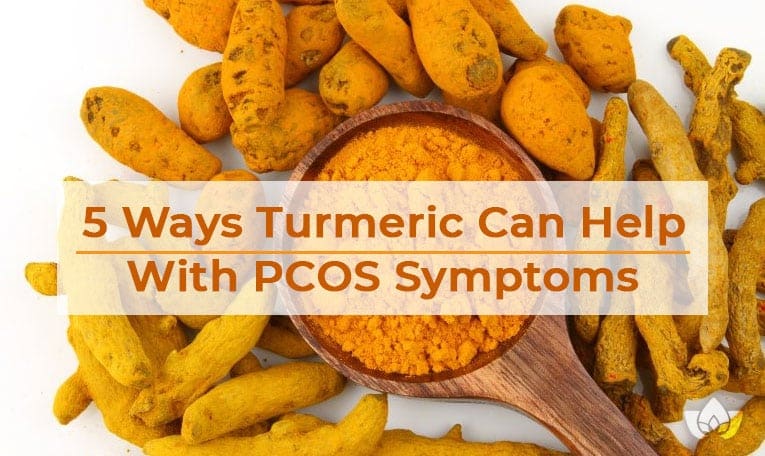 Polycystic ovary syndrome – also known as PCOS – occurs when women experience elevated levels of male hormones, called androgens.
It occurs most commonly in young women, from about 18-30 years of age, and is often a result of unhealthy lifestyle choices, such as eating too much fast, greasy food.
Some of the symptoms of PCOS include irregular menstruation, difficulty conceiving, excess hair over the face and body, acne, pelvic pain, and dark skin patches.
Luckily, researchers have linked relief and management of PCOS with the many benefits of curcumin, which we will look at here.
What Is Turmeric?
Turmeric is a bright yellow root that is famously one of the main spices used in curry, giving it its distinctive colour.
While it has a unique flavour many enjoy, what you may not have realized just how healthy that spice is that you're consuming.
Turmeric's Active Ingredient: Curcumin
The active ingredient in Turmeric is curcumin, a substance that is an exceptionally powerful anti-inflammatory and anti-oxidant.
However, it's important to note that it is not easily absorbed into the bloodstream unless it is activated by black pepper, which increases its efficacy by an incredible 2000%.
5 Ways Turmeric Helps With PCOS
Turmeric is a go-to when it comes to treating PCOS, because of the following five ways it can help out the patient.
1. It Has Anti-Oxidant Properties
Curcumin is a superhero anti-oxidant that neutralizes free radicals, which are being investigated as the ultimate cause of aging, cardiovascular disease, arthritis, cancer and pulmonary
disease.
And even while being an anti-oxidant itself, it also triggers production of the body's own anti-oxidant enzymes.
Free radicals travel around your body causing oxidative stress, so reducing that stress can help treat conditions such as PCOS.
2. It Lowers Risk Of Heart Disease
According to a 2011 study by de Groot et al, women who suffer from PCOS have an increased chance
of heart disease, including stroke, atherosclerosis and coronary heart disease.
Once again, it is the ability of curcumin to reduce oxidization of low-density lipoproteins that makes it so effective.
When they are oxidized, they lead to atherosclerotic plaque, which is common for women with PCOS.
Studies such as this one conducted in 2009 by Wongcharoen and Phrommintikul show that curcumin
serves to protect against cardiovascular issues by reducing oxidative stress, apoptosis and inflammation.
Polycystic ovary syndrome – also known as PCOS – occurs when women experience elevated levels of male hormones, called androgens.
It occurs most commonly in young women, from about 18-30 years of age, and is often a result of unhealthy lifestyle choices, such as eating too much fast, greasy food.
Some of the symptoms of PCOS include irregular menstruation, difficulty conceiving, excess hair over the face and body, acne, pelvic pain, and dark skin patches.
Luckily, researchers have linked relief and management of PCOS with the many benefits of curcumin, which we will look at here.
What Is Turmeric?
Turmeric is a bright yellow root that is famously one of the main spices used in curry, giving it its distinctive colour.
While it has a unique flavour many enjoy, what you may not have realized just how healthy that spice is that you're consuming.
Turmeric's Active Ingredient: Curcumin
The active ingredient in Turmeric is curcumin, a substance that is an exceptionally powerful anti-inflammatory and anti-oxidant.
However, it's important to note that it is not easily absorbed into the bloodstream unless it is activated by black pepper, which increases its efficacy by an incredible 2000%.
5 Ways Turmeric Helps With PCOS
Turmeric is a go-to when it comes to treating PCOS, because of the following five ways it can help out the patient.
1. It Has Anti-Oxidant Properties
Curcumin is a superhero anti-oxidant that neutralizes free radicals, which are being investigated as the ultimate cause of aging, cardiovascular disease, arthritis, cancer and pulmonary
disease.
And even while being an anti-oxidant itself, it also triggers production of the body's own anti-oxidant enzymes.
Free radicals travel around your body causing oxidative stress, so reducing that stress can help treat conditions such as PCOS.
2. It Lowers Risk Of Heart Disease
According to a 2011 study by de Groot et al, women who suffer from PCOS have an increased chance
of heart disease, including stroke, atherosclerosis and coronary heart disease.
Once again, it is the ability of curcumin to reduce oxidization of low-density lipoproteins that makes it so effective.
When they are oxidized, they lead to atherosclerotic plaque, which is common for women with PCOS.
Studies such as this one conducted in 2009 by Wongcharoen and Phrommintikul show that curcumin
serves to protect against cardiovascular issues by reducing oxidative stress, apoptosis and inflammation.
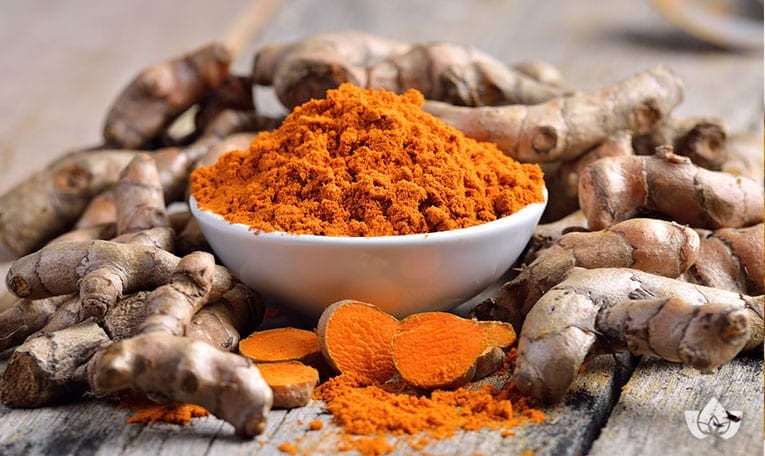 3. It Has Anti-Inflammatory Properties
The anti-inflammatory properties of Turmeric are well known, and have been used for centuries to treat inflammatory conditions such as arthritis, as shown in this 2017 study by Arshad, Haque, Abbas Bukhari, and Jantan.
Cysts are also a result of inflammation, and they are one of the symptoms of PCOS.
For women with PCOS, cysts usually form because of abnormal hormonal levels, but this can be alleviated and managed with an anti-inflammatory diet and supplements.
4. It May Help With Weight Loss
PCOS sufferers often struggle with weight gain, which also increases the risk of developing PCOS.
If obesity is a common side effect of PCOS, then maintaining a healthy diet is important in reducing the impact of the condition.
PCOS is a metabolic syndrome, and if your metabolism is compromised, then it's almost always going to mean weight issues.
Studies have showed positive results that administering curcumin does indeed reduce overall weight in patients.
5. It May Help With Depression
While there's no cure for depression, a roster of helpful treatments can make a huge difference, and turmeric is definitely one to keep in your back pocket.
This 2014 study by Lopresti et al shows that it is a partially effective antidepressant for those
suffering from major depressive disorder; benefits were noticed between 4-8 weeks after the start of treatment with curcumin.
Inflammation has been identified as a contributing factor to depression, and curcumin treats that underlying cause, almost as well as conventional anti-depressants.
Contact The Mindful Healing Clinic
If you suffer with PCOS or any of its side effects, I urge you to book a consultation with me now.
As a naturopathic doctor, I have been recommending curcumin to patients for years and have helped many to manage their symptoms better.
Don't delay – call now to talk to me about whether curcumin supplements can help one of your ailments, including PCOS.
Until next time,
Dr. Maria Cavallazzi, N.D
Mindful Healing Integrative Naturopathy
251 Queen St S Unit 4,
Mississauga, ON L5M 1L7
- https://goo.gl/maps/KYspifT7J232
Dr. Maria Cavallazzi is a medical doctor from Colombia where she practiced as a family physician for 8 years until she moved to Canada 16 years ago.
To read more information about health, wellness, and alternative medicine, please visit us here: naturopathic clinic
3. It Has Anti-Inflammatory Properties
The anti-inflammatory properties of Turmeric are well known, and have been used for centuries to treat inflammatory conditions such as arthritis, as shown in this 2017 study by Arshad, Haque, Abbas Bukhari, and Jantan.
Cysts are also a result of inflammation, and they are one of the symptoms of PCOS.
For women with PCOS, cysts usually form because of abnormal hormonal levels, but this can be alleviated and managed with an anti-inflammatory diet and supplements.
4. It May Help With Weight Loss
PCOS sufferers often struggle with weight gain, which also increases the risk of developing PCOS.
If obesity is a common side effect of PCOS, then maintaining a healthy diet is important in reducing the impact of the condition.
PCOS is a metabolic syndrome, and if your metabolism is compromised, then it's almost always going to mean weight issues.
Studies have showed positive results that administering curcumin does indeed reduce overall weight in patients.
5. It May Help With Depression
While there's no cure for depression, a roster of helpful treatments can make a huge difference, and turmeric is definitely one to keep in your back pocket.
This 2014 study by Lopresti et al shows that it is a partially effective antidepressant for those
suffering from major depressive disorder; benefits were noticed between 4-8 weeks after the start of treatment with curcumin.
Inflammation has been identified as a contributing factor to depression, and curcumin treats that underlying cause, almost as well as conventional anti-depressants.
Contact The Mindful Healing Clinic
If you suffer with PCOS or any of its side effects, I urge you to book a consultation with me now.
As a naturopathic doctor, I have been recommending curcumin to patients for years and have helped many to manage their symptoms better.
Don't delay – call now to talk to me about whether curcumin supplements can help one of your ailments, including PCOS.
Until next time,
Dr. Maria Cavallazzi, N.D
Mindful Healing Integrative Naturopathy
251 Queen St S Unit 4,
Mississauga, ON L5M 1L7
- https://goo.gl/maps/KYspifT7J232
Dr. Maria Cavallazzi is a medical doctor from Colombia where she practiced as a family physician for 8 years until she moved to Canada 16 years ago.
To read more information about health, wellness, and alternative medicine, please visit us here: naturopathic clinic
>> Read More
Naturopathic Solutions For Polycistic Ovary Syndrom (PCOS) Part 1 (Sun, 28 Oct 2018)
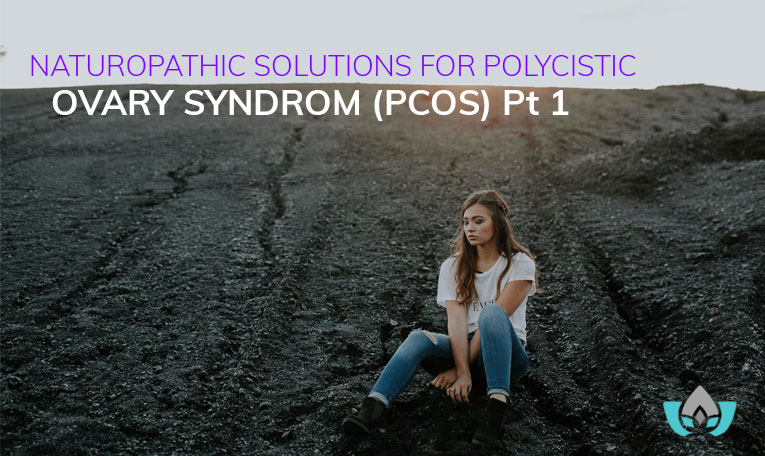 Polycystic Ovary Syndrome, also known as PCOS, is a syndrome which affects the hormone levels of some women and causes them to produce higher than normal levels of androgen hormones, such
as testosterone.
Patients with PCOS experience skipped menstrual periods, difficulty getting pregnant, and higher levels of body hair growth.
It can also cause increased chances of developing diabetes and heart disease.
However, there are naturopathic PCOS solutions available if you have been diagnosed with PCOS.
What exactly is PCOS, and what naturopathic solutions are available?
Keep reading to find out.
What Is PCOS?
Polycystic Ovary Syndrome is the most common endocrine disorder in women of reproductive age, affecting an estimated 8.7% of women between 27-34.
Many women who have PCOS go undiagnosed -- in the study above, up to 70% of the women studied had PCOS but did not know it.
PCOS is not just defined by having higher levels of male hormones, which cause irregular and infrequent periods, it is also identified by the presence of cysts (fluid-filled sacs) in the
ovaries. The “polycystic” portion of the name means “many cysts”.
These cysts are follicles containing an immature egg; these eggs never mature enough to trigger ovulation.
When ovulation does not occur, it alters the levels of estrogen, progesterone, follicle-stimulating hormone (FSH), and luteinizing hormone (LH). FSH stimulates the follicle to produce an
egg and LH triggers the ovary to release a mature egg.
Causes Of PCOS
There are several genetic components which may contribute to PCOS.
PCOS often occurs alongside insulin resistance and inflammation in the body.
When a body is insulin resistant, the body's demand for insulin increases and the pancreas makes additional insulin. Higher insulin levels cause the ovaries to produce more male hormones.
Studies have connected chronic inflammation to the pathogenesis of PCOS.
Symptoms Of PCOS
The altered hormone levels of PCOS can cause a variety of symptoms throughout the body.
These symptoms include:
● Heavy & irregular periods
● Male-pattern hair grow
● Acne
● Weight gain
● Headaches
● Painful cramping during periods
In addition to these symptoms, PCOS has other effects on the body.
Effects of PCOS
Many aspects of your health can be affected by higher androgen levels. Below are a few long-term effects you may experience if you have PCOS.
Polycystic Ovary Syndrome, also known as PCOS, is a syndrome which affects the hormone levels of some women and causes them to produce higher than normal levels of androgen hormones, such
as testosterone.
Patients with PCOS experience skipped menstrual periods, difficulty getting pregnant, and higher levels of body hair growth.
It can also cause increased chances of developing diabetes and heart disease.
However, there are naturopathic PCOS solutions available if you have been diagnosed with PCOS.
What exactly is PCOS, and what naturopathic solutions are available?
Keep reading to find out.
What Is PCOS?
Polycystic Ovary Syndrome is the most common endocrine disorder in women of reproductive age, affecting an estimated 8.7% of women between 27-34.
Many women who have PCOS go undiagnosed -- in the study above, up to 70% of the women studied had PCOS but did not know it.
PCOS is not just defined by having higher levels of male hormones, which cause irregular and infrequent periods, it is also identified by the presence of cysts (fluid-filled sacs) in the
ovaries. The “polycystic” portion of the name means “many cysts”.
These cysts are follicles containing an immature egg; these eggs never mature enough to trigger ovulation.
When ovulation does not occur, it alters the levels of estrogen, progesterone, follicle-stimulating hormone (FSH), and luteinizing hormone (LH). FSH stimulates the follicle to produce an
egg and LH triggers the ovary to release a mature egg.
Causes Of PCOS
There are several genetic components which may contribute to PCOS.
PCOS often occurs alongside insulin resistance and inflammation in the body.
When a body is insulin resistant, the body's demand for insulin increases and the pancreas makes additional insulin. Higher insulin levels cause the ovaries to produce more male hormones.
Studies have connected chronic inflammation to the pathogenesis of PCOS.
Symptoms Of PCOS
The altered hormone levels of PCOS can cause a variety of symptoms throughout the body.
These symptoms include:
● Heavy & irregular periods
● Male-pattern hair grow
● Acne
● Weight gain
● Headaches
● Painful cramping during periods
In addition to these symptoms, PCOS has other effects on the body.
Effects of PCOS
Many aspects of your health can be affected by higher androgen levels. Below are a few long-term effects you may experience if you have PCOS.
 1. Metabolic Syndrome
Since its original description, PCOS has been linked to obesity; in a recent study, an estimated 80% of American women
with PCOS are overweight or obese.
This number lowers in countries outside of the US to as low as 20%.
PCOS and obesity both increase the risk of high blood pressure, high blood sugar, high “bad” cholesterol (LDL), and low “good” cholesterol (HDL).
The combination of these symptoms are known as metabolic syndrome; this increases the likelihood of developing heart disease, stroke, and diabetes.
2. Infertility
One of the symptoms of PCOS is the inability to ovulate.
If you are unable to ovulate, you are unable to become pregnant.
This makes PCOS one of the leading causes of infertility.
3. Depression & Anxiety
Hormone levels affect your mental health.
When your hormones are out of balance from having PCOS, it can put you at a higher risk for developing depression or anxiety.
In a recent study, women with PCOS had higher levels of psychological distress than those without.
4. Endometrial Cancer
The irregular periods experienced with PCOS can increase your risk of endometrial cancer.
During menstruation, the uterine lining sheds; if periods are irregular, this lining can build up over time, and a thickened uterine lining causes an increased cancer risk.
5. Sleep Apnea
The risk for sleep apnea comes from the correlation between PCOS and obesity, since sleep apnea is more common in patients who are overweight.
Patients with sleep apnea experience interrupted sleep due to pauses in breathing during sleep.
Contact The Mindful Healing Clinic
There are naturopathic solutions available for patients with PCOS.
If you have been diagnosed with PCOS, or if you suspect that you may have PCOS, contact me, Dr. Maria Cavallazzi, at the Mindful Healing Clinic.
During your initial appointment, you'll get a chance to sit down with me where we can talk about your PCOS and any other health concerns you may have. From there, we'll talk about a
treatment plan based on your unique health needs.
Contact the Mindful Healing Clinic to book your FREE 15-minute introductory session today.
Next week we'll talk about some of the naturopathic solutions for PCOS that are available.
Until next time,
Dr. Maria Cavallazzi, N.D
Mindful Healing Integrative Naturopathy
251 Queen St S Unit 4,
Mississauga, ON L5M 1L7
- https://goo.gl/maps/KYspifT7J232
Dr. Maria Cavallazzi is a medical doctor from Colombia where she practiced as a family physician for 8 years until she moved to Canada 16 years ago.
To learn more info about health, wellness, and alternative medicine, please visit us here: find a naturopath
1. Metabolic Syndrome
Since its original description, PCOS has been linked to obesity; in a recent study, an estimated 80% of American women
with PCOS are overweight or obese.
This number lowers in countries outside of the US to as low as 20%.
PCOS and obesity both increase the risk of high blood pressure, high blood sugar, high “bad” cholesterol (LDL), and low “good” cholesterol (HDL).
The combination of these symptoms are known as metabolic syndrome; this increases the likelihood of developing heart disease, stroke, and diabetes.
2. Infertility
One of the symptoms of PCOS is the inability to ovulate.
If you are unable to ovulate, you are unable to become pregnant.
This makes PCOS one of the leading causes of infertility.
3. Depression & Anxiety
Hormone levels affect your mental health.
When your hormones are out of balance from having PCOS, it can put you at a higher risk for developing depression or anxiety.
In a recent study, women with PCOS had higher levels of psychological distress than those without.
4. Endometrial Cancer
The irregular periods experienced with PCOS can increase your risk of endometrial cancer.
During menstruation, the uterine lining sheds; if periods are irregular, this lining can build up over time, and a thickened uterine lining causes an increased cancer risk.
5. Sleep Apnea
The risk for sleep apnea comes from the correlation between PCOS and obesity, since sleep apnea is more common in patients who are overweight.
Patients with sleep apnea experience interrupted sleep due to pauses in breathing during sleep.
Contact The Mindful Healing Clinic
There are naturopathic solutions available for patients with PCOS.
If you have been diagnosed with PCOS, or if you suspect that you may have PCOS, contact me, Dr. Maria Cavallazzi, at the Mindful Healing Clinic.
During your initial appointment, you'll get a chance to sit down with me where we can talk about your PCOS and any other health concerns you may have. From there, we'll talk about a
treatment plan based on your unique health needs.
Contact the Mindful Healing Clinic to book your FREE 15-minute introductory session today.
Next week we'll talk about some of the naturopathic solutions for PCOS that are available.
Until next time,
Dr. Maria Cavallazzi, N.D
Mindful Healing Integrative Naturopathy
251 Queen St S Unit 4,
Mississauga, ON L5M 1L7
- https://goo.gl/maps/KYspifT7J232
Dr. Maria Cavallazzi is a medical doctor from Colombia where she practiced as a family physician for 8 years until she moved to Canada 16 years ago.
To learn more info about health, wellness, and alternative medicine, please visit us here: find a naturopath
>> Read More
Naturopathic Solutions For PMS (Sun, 02 Sep 2018)
 As a Naturopathic Doctor, I get many questions from my clients about PMS and its symptoms.
Are there naturopathic solutions for PMS available? What can be done, naturally, to relieve it?
Many of us suffer, but the good news is that there are steps that can be taken without resorting to medication.
To help you understand what your body is experiencing and how to help it, have a read below.
What Is PMS?
PMS, or Premenstrual Syndrome, describes the varied symptoms that affect women in the week or two before their periods, occasionally lasting through their menstruation period itself.
Although only 1 in 20 women will experience severe symptoms, up to 75% of women report experiencing one or more of them.
Some of the most common symptoms include:
• Cramps
• Bloating
• Breast sensitivity
• Irritability
• Depression
• Anxiety
• Acne
• Headaches
Many women also report food cravings and indigestion.
PMDD, or Premenstrual Dysmorphic Disorder, describes the more severe range of symptoms, which can be the same as above, but far more debilitating.
What Causes PMS?
Although it's likely connected with the cyclic monthly hormonal changes in women, we don't actually know exactly what causes PMS.
Changes in serotonin levels in the brain may be the cause of symptoms like fatigue and irritability or depression.
A review by Ryu and Kim talks of theories suggesting increased sensitivity to normal hormone
changes and abnormalities in neurotransmitters may be connected, but thus far studies are inconclusive.
Dietary Solutions For PMS Symptoms
Just because we don't know exactly what causes PMS, though, doesn't mean we haven't developed treatments for it.
There are a number of dietary supplements which have been shown to help control PMS symptoms, a number of which we'll talk about below.
As a Naturopathic Doctor, I get many questions from my clients about PMS and its symptoms.
Are there naturopathic solutions for PMS available? What can be done, naturally, to relieve it?
Many of us suffer, but the good news is that there are steps that can be taken without resorting to medication.
To help you understand what your body is experiencing and how to help it, have a read below.
What Is PMS?
PMS, or Premenstrual Syndrome, describes the varied symptoms that affect women in the week or two before their periods, occasionally lasting through their menstruation period itself.
Although only 1 in 20 women will experience severe symptoms, up to 75% of women report experiencing one or more of them.
Some of the most common symptoms include:
• Cramps
• Bloating
• Breast sensitivity
• Irritability
• Depression
• Anxiety
• Acne
• Headaches
Many women also report food cravings and indigestion.
PMDD, or Premenstrual Dysmorphic Disorder, describes the more severe range of symptoms, which can be the same as above, but far more debilitating.
What Causes PMS?
Although it's likely connected with the cyclic monthly hormonal changes in women, we don't actually know exactly what causes PMS.
Changes in serotonin levels in the brain may be the cause of symptoms like fatigue and irritability or depression.
A review by Ryu and Kim talks of theories suggesting increased sensitivity to normal hormone
changes and abnormalities in neurotransmitters may be connected, but thus far studies are inconclusive.
Dietary Solutions For PMS Symptoms
Just because we don't know exactly what causes PMS, though, doesn't mean we haven't developed treatments for it.
There are a number of dietary supplements which have been shown to help control PMS symptoms, a number of which we'll talk about below.
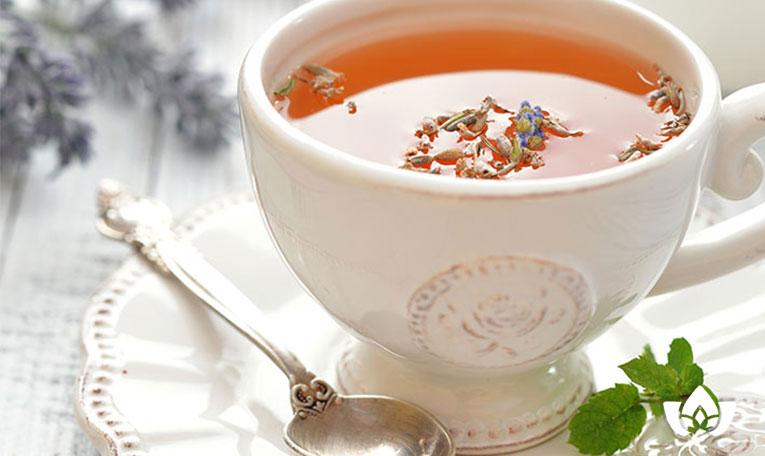 1. Eat These Foods
Food provides you with the ability to control your symptoms to a degree - you just need to know what their vitamins and minerals do.
To relieve cramping, try leafy green vegetables, which contain Magnesium.
Magnesium, in its various forms, is an excellent muscle relaxant and important for metabolizing estrogen.
For stomach aches, irritability and indigestion, be sure to consume enough fiber.
For pain and inflammation, find foods that are high in omega 3 fats, such as wild salmon or other fish, or flaxseed.
Flaxseed also does double duty by helping regulate estrogen.
In addition to these, try to consume lots of fruits, vegetables, nuts and seeds. These have been shown to reduce severe PMS symptoms.
Avocados, in particular, have many of the benefits listed above, so feel free to indulge in that avocado toast.
2. Avoid These Foods
Just as food can help relieve symptoms, it can also exacerbate them, so try to avoid salt, sugar, and the 'bad fats,' such as trans- and hydrogenated-fat.
Try to also be mindful of your caffeine intake, which can worsen symptoms like irritability, depression and anxiety, as well as breast tenderness.
3. Chasteberry Herbal Supplements
Chasteberry is a fantastic natural supplement that is a great help in balancing estrogen and progesterone, the two most important hormones in regulating your monthly cycle.
Women who take chasteberry supplements report much less tender breasts during their menstrual cycles, and for many, less cramping and bloating.
It is considered that the combination of Chasteberry and St. John's Wort is quite successful in relieving the symptoms of depression and food cravings.
4. Evening Primrose Oil
Evening primrose oil contains Omega 6, which the body can't get through food sources, but needs.
Evening primrose oil can help reduce skin irritability, help with inflammation, bloating and cramping, and also breast pain.
However, if you take medication for seizures or blood pressure, or if you are on blood thinners, you should definitely speak with a naturopathic doctor or other qualified healthcare
practitioner before beginning.
5. Ginkgo Biloba
Ginkgo Bilboa has been used for thousands of years in Chinese medicine to improve memory and circulation.
Ginkgo extracts is known to have two powerful antioxidants, which slow down the effects of aging.
It is also well-known for improving mental and cognitive health.
Research suggests it targets and reduces many PMS symptoms, including mood swings, headaches, anxiety, fatigue and muscle pain.
Contact The Mindful Healing Clinic
Think back to your last period...what was your experience?
How painful was it, or how did impact your ability to go about your day, do your job or enjoy your family time?
If you're having trouble with your monthly cycle, there are naturopathic solutions available which may help ease your suffering.
To find out more about how naturopathic medicine can help you, contact me, Dr. Maria Cavallazzi, at the Mindful Healing Clinic here in Mississauga.
If it's your first time, I offer a FREE 15-minute consultation, where you'll get a chance to ask any questions you have about naturopathic medicine.
From there, I'll address any health concerns you have, and we can talk about some possible solutions for you.
I've helped many find relief from their PMS symptoms through naturopathic medicine.
Contact the Mindful Healing Clinic today, and find out naturopathic medicine may help you achieve PMS freedom.
Until next time,
Dr. Maria Cavallazzi, N.D
Mindful Healing Integrative Naturopathy
251 Queen St S Unit 4,
Mississauga, ON L5M 1L7
- https://goo.gl/maps/KYspifT7J232
Dr. Maria Cavallazzi is a medical doctor from Colombia where she practiced as a family physician for 8 years until she moved to Canada 16 years ago.
To find additional ways about health, wellness, and alternative medicine, please visit us here: naturopathy
1. Eat These Foods
Food provides you with the ability to control your symptoms to a degree - you just need to know what their vitamins and minerals do.
To relieve cramping, try leafy green vegetables, which contain Magnesium.
Magnesium, in its various forms, is an excellent muscle relaxant and important for metabolizing estrogen.
For stomach aches, irritability and indigestion, be sure to consume enough fiber.
For pain and inflammation, find foods that are high in omega 3 fats, such as wild salmon or other fish, or flaxseed.
Flaxseed also does double duty by helping regulate estrogen.
In addition to these, try to consume lots of fruits, vegetables, nuts and seeds. These have been shown to reduce severe PMS symptoms.
Avocados, in particular, have many of the benefits listed above, so feel free to indulge in that avocado toast.
2. Avoid These Foods
Just as food can help relieve symptoms, it can also exacerbate them, so try to avoid salt, sugar, and the 'bad fats,' such as trans- and hydrogenated-fat.
Try to also be mindful of your caffeine intake, which can worsen symptoms like irritability, depression and anxiety, as well as breast tenderness.
3. Chasteberry Herbal Supplements
Chasteberry is a fantastic natural supplement that is a great help in balancing estrogen and progesterone, the two most important hormones in regulating your monthly cycle.
Women who take chasteberry supplements report much less tender breasts during their menstrual cycles, and for many, less cramping and bloating.
It is considered that the combination of Chasteberry and St. John's Wort is quite successful in relieving the symptoms of depression and food cravings.
4. Evening Primrose Oil
Evening primrose oil contains Omega 6, which the body can't get through food sources, but needs.
Evening primrose oil can help reduce skin irritability, help with inflammation, bloating and cramping, and also breast pain.
However, if you take medication for seizures or blood pressure, or if you are on blood thinners, you should definitely speak with a naturopathic doctor or other qualified healthcare
practitioner before beginning.
5. Ginkgo Biloba
Ginkgo Bilboa has been used for thousands of years in Chinese medicine to improve memory and circulation.
Ginkgo extracts is known to have two powerful antioxidants, which slow down the effects of aging.
It is also well-known for improving mental and cognitive health.
Research suggests it targets and reduces many PMS symptoms, including mood swings, headaches, anxiety, fatigue and muscle pain.
Contact The Mindful Healing Clinic
Think back to your last period...what was your experience?
How painful was it, or how did impact your ability to go about your day, do your job or enjoy your family time?
If you're having trouble with your monthly cycle, there are naturopathic solutions available which may help ease your suffering.
To find out more about how naturopathic medicine can help you, contact me, Dr. Maria Cavallazzi, at the Mindful Healing Clinic here in Mississauga.
If it's your first time, I offer a FREE 15-minute consultation, where you'll get a chance to ask any questions you have about naturopathic medicine.
From there, I'll address any health concerns you have, and we can talk about some possible solutions for you.
I've helped many find relief from their PMS symptoms through naturopathic medicine.
Contact the Mindful Healing Clinic today, and find out naturopathic medicine may help you achieve PMS freedom.
Until next time,
Dr. Maria Cavallazzi, N.D
Mindful Healing Integrative Naturopathy
251 Queen St S Unit 4,
Mississauga, ON L5M 1L7
- https://goo.gl/maps/KYspifT7J232
Dr. Maria Cavallazzi is a medical doctor from Colombia where she practiced as a family physician for 8 years until she moved to Canada 16 years ago.
To find additional ways about health, wellness, and alternative medicine, please visit us here: naturopathy
>> Read More
Pregnancy & Conception For Women Over 40 (Sun, 26 Aug 2018)
 It's more and more common these days for women to be starting or growing their family well into their forties.
While women's reproductive health has improved significantly in the last couple of decades, many can nevertheless experience challenges conceiving as they grow older.
Science can assist with some of these, and many women opt to undergo procedures such as hormone injections, intrauterine insemination or in vitro fertilization.
For others, there are barriers to such treatments; some do not wish to undergo the invasive physical trials, for others there is a financial barrier, others still prefer to treat their
bodies more naturally and look at what can be done to improve the odds without drastic measures.
However, there are options for fertility for women over 40 available, including naturopathic methods.
Why Does Age Affect Female Fertility?
As women age, their bodies' hormone production changes.
Specifically, progesterone and estrogen see a decline, which are the primary hormones responsible for the menstrual cycle and conception.
Once women reach age 32, there is a small yet gradual decline in the chances of conception, and by 40, the chances of getting pregnant are half what they were at 30.
Risks Of Pregnancy After Age 40
As we now know, father's age can also factor in to pregnancy risks, such as congenital autism.
On the mother's side, not only can the fetus be at risk, but the mother herself.
• They can be at a higher risk of stillbirth and miscarriage
• Gestational diabetes is higher in women over 40
• Pre-eclampsia
• Placental issues (placenta previa and placental insufficiency)
Down syndrome does also see an increase with an older mother, as well as the accuracy of the tests themselves.
Naturopathic Treatments For Female Fertility
Luckily, there are natural ways for preparing for conception and keeping your pregnancy viable.
Keep reading to find out more.
This article, of course, is only for informational purposes. For more details on naturopathic treatments for fertility, book an appointment with us at the Mindful Healing Clinic.
It's more and more common these days for women to be starting or growing their family well into their forties.
While women's reproductive health has improved significantly in the last couple of decades, many can nevertheless experience challenges conceiving as they grow older.
Science can assist with some of these, and many women opt to undergo procedures such as hormone injections, intrauterine insemination or in vitro fertilization.
For others, there are barriers to such treatments; some do not wish to undergo the invasive physical trials, for others there is a financial barrier, others still prefer to treat their
bodies more naturally and look at what can be done to improve the odds without drastic measures.
However, there are options for fertility for women over 40 available, including naturopathic methods.
Why Does Age Affect Female Fertility?
As women age, their bodies' hormone production changes.
Specifically, progesterone and estrogen see a decline, which are the primary hormones responsible for the menstrual cycle and conception.
Once women reach age 32, there is a small yet gradual decline in the chances of conception, and by 40, the chances of getting pregnant are half what they were at 30.
Risks Of Pregnancy After Age 40
As we now know, father's age can also factor in to pregnancy risks, such as congenital autism.
On the mother's side, not only can the fetus be at risk, but the mother herself.
• They can be at a higher risk of stillbirth and miscarriage
• Gestational diabetes is higher in women over 40
• Pre-eclampsia
• Placental issues (placenta previa and placental insufficiency)
Down syndrome does also see an increase with an older mother, as well as the accuracy of the tests themselves.
Naturopathic Treatments For Female Fertility
Luckily, there are natural ways for preparing for conception and keeping your pregnancy viable.
Keep reading to find out more.
This article, of course, is only for informational purposes. For more details on naturopathic treatments for fertility, book an appointment with us at the Mindful Healing Clinic.
 1. Diet & Nutritional Supplements
Probably the most influential thing you can do is improve your daily diet to meet recommended daily intake for optimal minerals and vitamins.
In fact, it's so important that there was even a study and subsequent book published to educate women about what to consume and what to avoid, entitled The Fertility Diet, by Dr. Jorge Chavarro
Diet can be bolstered by choosing the right supplements for your needs, but there are specific recommendations for moms-to-be over 35.
The first of these is co-enzyme Q10, which aids in improving egg quality.
Secondly, in addressing quantity, you may want to ask your doctor about DHEA.
DHEA is a natural hormone that seems to improve egg production, thereby improving your chances of conceiving.
Finally, another common recommendation is royal jelly, which has been around for centuries, and which assists in longevity, lower blood pressure and reduced lethargy, as well as
fertility.
2. Acupuncture
Many people swear by acupuncture to help them with their various aches, pains and stiffness.
Acupuncture can also be used to assist with imbalances within the body in order to encourage a fertile environment.
Many women who have suffered through miscarriages and inability to conceive have successfully carried a child to term after speaking with a knowledgeable acupuncturist and undergoing a
few sessions.
Acupuncture can also be used throughout the pregnancy in order to keep the pregnancy stable, and so many women opt for this, too.
3. Reduce Your Vices
You know what they are: coffee, smoking, alcohol.
These drugs are all known to reduce fertility as well as interrupt sleep cycles and stress the body.
The effects of these vices on human health have been scientifically documented for a long time, and we all know they are unhealthy for both the parents and the fetus.
4. Improve Your Sleep Schedule
Fertility is linked to your circadian rhythms, so listening to your body and getting the sleep you need is crucial for reproductive health.
Be sure to get lots of quality sleep to give your body what it needs to nourish life.
Turn off the devices at least a half hour before you turn off the light.
Speaking of which – be sure to sleep in as dark an environment as you can achieve in order to get a deep sleep.
Try to keep the rhythm by going to bed and waking up at the same time every day.
If you work at shift work, try to negotiate to have your schedule changed, if possible, as the disrupted sleep patterns have been linked to higher risk of miscarriage.
5. See A Naturopathic Doctor
When you are already emotionally and physically stressed with the desire and attempts to get pregnant, one of the best things you can do is share the burden.
My name is Dr. Maria Cavallazzi and I am a Naturopathic Doctor in downtown Mississauga-Streetsville.
If you're having trouble with conception, or you're thinking of conceiving a child, contact me to book a FREE 15-minute initial health consultation.
We'll sit down together and talk about your health concerns, your pregnancy goals, and any other concerns you may have. I'll answer all your questions, and from there we can talk about
possible treatment plans.
Contact us here at the Mindful Healing Clinic today to book your FREE 15-minute naturopathic consultation today.
Until next time,
Dr. Maria Cavallazzi, N.D
Mindful Healing Integrative Naturopathy
251 Queen St S Unit 4,
Mississauga, ON L5M 1L7
- https://goo.gl/maps/KYspifT7J232
Dr. Maria Cavallazzi is a medical doctor from Colombia where she practiced as a family physician for 8 years until she moved to Canada 16 years ago.
To find more ideas on health, wellness, and alternative medicine, please visit us here: Mindful Healing Naturopathic
1. Diet & Nutritional Supplements
Probably the most influential thing you can do is improve your daily diet to meet recommended daily intake for optimal minerals and vitamins.
In fact, it's so important that there was even a study and subsequent book published to educate women about what to consume and what to avoid, entitled The Fertility Diet, by Dr. Jorge Chavarro
Diet can be bolstered by choosing the right supplements for your needs, but there are specific recommendations for moms-to-be over 35.
The first of these is co-enzyme Q10, which aids in improving egg quality.
Secondly, in addressing quantity, you may want to ask your doctor about DHEA.
DHEA is a natural hormone that seems to improve egg production, thereby improving your chances of conceiving.
Finally, another common recommendation is royal jelly, which has been around for centuries, and which assists in longevity, lower blood pressure and reduced lethargy, as well as
fertility.
2. Acupuncture
Many people swear by acupuncture to help them with their various aches, pains and stiffness.
Acupuncture can also be used to assist with imbalances within the body in order to encourage a fertile environment.
Many women who have suffered through miscarriages and inability to conceive have successfully carried a child to term after speaking with a knowledgeable acupuncturist and undergoing a
few sessions.
Acupuncture can also be used throughout the pregnancy in order to keep the pregnancy stable, and so many women opt for this, too.
3. Reduce Your Vices
You know what they are: coffee, smoking, alcohol.
These drugs are all known to reduce fertility as well as interrupt sleep cycles and stress the body.
The effects of these vices on human health have been scientifically documented for a long time, and we all know they are unhealthy for both the parents and the fetus.
4. Improve Your Sleep Schedule
Fertility is linked to your circadian rhythms, so listening to your body and getting the sleep you need is crucial for reproductive health.
Be sure to get lots of quality sleep to give your body what it needs to nourish life.
Turn off the devices at least a half hour before you turn off the light.
Speaking of which – be sure to sleep in as dark an environment as you can achieve in order to get a deep sleep.
Try to keep the rhythm by going to bed and waking up at the same time every day.
If you work at shift work, try to negotiate to have your schedule changed, if possible, as the disrupted sleep patterns have been linked to higher risk of miscarriage.
5. See A Naturopathic Doctor
When you are already emotionally and physically stressed with the desire and attempts to get pregnant, one of the best things you can do is share the burden.
My name is Dr. Maria Cavallazzi and I am a Naturopathic Doctor in downtown Mississauga-Streetsville.
If you're having trouble with conception, or you're thinking of conceiving a child, contact me to book a FREE 15-minute initial health consultation.
We'll sit down together and talk about your health concerns, your pregnancy goals, and any other concerns you may have. I'll answer all your questions, and from there we can talk about
possible treatment plans.
Contact us here at the Mindful Healing Clinic today to book your FREE 15-minute naturopathic consultation today.
Until next time,
Dr. Maria Cavallazzi, N.D
Mindful Healing Integrative Naturopathy
251 Queen St S Unit 4,
Mississauga, ON L5M 1L7
- https://goo.gl/maps/KYspifT7J232
Dr. Maria Cavallazzi is a medical doctor from Colombia where she practiced as a family physician for 8 years until she moved to Canada 16 years ago.
To find more ideas on health, wellness, and alternative medicine, please visit us here: Mindful Healing Naturopathic
>> Read More
Health Benefits of Spicy Foods (Sun, 19 Aug 2018)
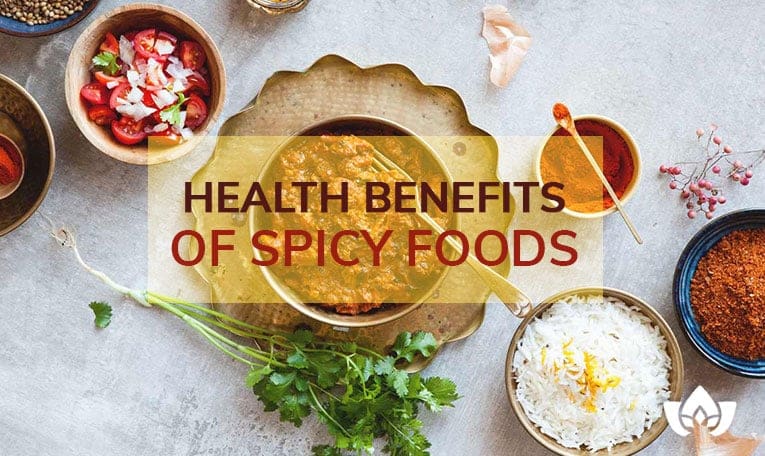 Mild, medium, hot, or on fire - how do you take your food?
Those who opt for the spicier options may be onto something when it comes to their health.
Some proponents of naturopathic medicine say that eating spicy foods has health benefits that many people don't
realize.
So what makes food taste spicy?
Why do some people LOVE to spice things up when they eat?
And what are the benefits of “kicking it up a notch” when it comes to spice?
Keep reading to find out.
What Makes Food Spicy?
Have you ever wondered why spicy food, such as a pepper, that may feel normal when you touch it with your hands, will feel so spicy when it hits your tongue?
Why such an innocuous looking veggie can make your eyes water?
It all has to do with how capsaicin - the active ingredient in spicy food - binds to the receptors on your tongue.
There are special receptors in our mouth called VR1 Receptors that are meant to detect heat - to warn us against consuming foods that will burn us.
But these special receptors also bind to capsaicin - and as a result, when they're activated, the sensation is similar to that of consuming food that is hot in temperature.
There is nothing really “hot” about hot foods - it's all an illusion caused by confused receptors.
Why Do We Love Spicy Food?
Despite the burning sensation left in our mouths by spice, some people just cannot get enough.
Do you ever wonder why it is that some people look at a plate full of “suicide wings” as a challenge to be conquered?
A 2012 study in the journal Psychiatry Investigation showed that the main component of
red peppers - capsaicin - causes the brain to release endorphins, which causes analgesic (pain-relieving) effect in humans.
So, after the initial burning sensation, it could actually cause reduction of pain.
Researchers have even developed creams with capsaicin in them to help treat arthritis pain.
This explains why some people just can't get enough spice in their life.
On a side note, if you happen to over-do it, reach for milk or peanut butter - these will help dissolve capsaicin better than water.
Health Benefits Of Eating Spicy Food
So we like spicy food and it can make us feel good.
But is there a reason beyond just “feeling good” to break out the peppers?
Some benefits of spicy food may include assisting with weight loss, helping to prevent cancer and keeping your heart healthy.
Let's take a closer look:
Mild, medium, hot, or on fire - how do you take your food?
Those who opt for the spicier options may be onto something when it comes to their health.
Some proponents of naturopathic medicine say that eating spicy foods has health benefits that many people don't
realize.
So what makes food taste spicy?
Why do some people LOVE to spice things up when they eat?
And what are the benefits of “kicking it up a notch” when it comes to spice?
Keep reading to find out.
What Makes Food Spicy?
Have you ever wondered why spicy food, such as a pepper, that may feel normal when you touch it with your hands, will feel so spicy when it hits your tongue?
Why such an innocuous looking veggie can make your eyes water?
It all has to do with how capsaicin - the active ingredient in spicy food - binds to the receptors on your tongue.
There are special receptors in our mouth called VR1 Receptors that are meant to detect heat - to warn us against consuming foods that will burn us.
But these special receptors also bind to capsaicin - and as a result, when they're activated, the sensation is similar to that of consuming food that is hot in temperature.
There is nothing really “hot” about hot foods - it's all an illusion caused by confused receptors.
Why Do We Love Spicy Food?
Despite the burning sensation left in our mouths by spice, some people just cannot get enough.
Do you ever wonder why it is that some people look at a plate full of “suicide wings” as a challenge to be conquered?
A 2012 study in the journal Psychiatry Investigation showed that the main component of
red peppers - capsaicin - causes the brain to release endorphins, which causes analgesic (pain-relieving) effect in humans.
So, after the initial burning sensation, it could actually cause reduction of pain.
Researchers have even developed creams with capsaicin in them to help treat arthritis pain.
This explains why some people just can't get enough spice in their life.
On a side note, if you happen to over-do it, reach for milk or peanut butter - these will help dissolve capsaicin better than water.
Health Benefits Of Eating Spicy Food
So we like spicy food and it can make us feel good.
But is there a reason beyond just “feeling good” to break out the peppers?
Some benefits of spicy food may include assisting with weight loss, helping to prevent cancer and keeping your heart healthy.
Let's take a closer look:
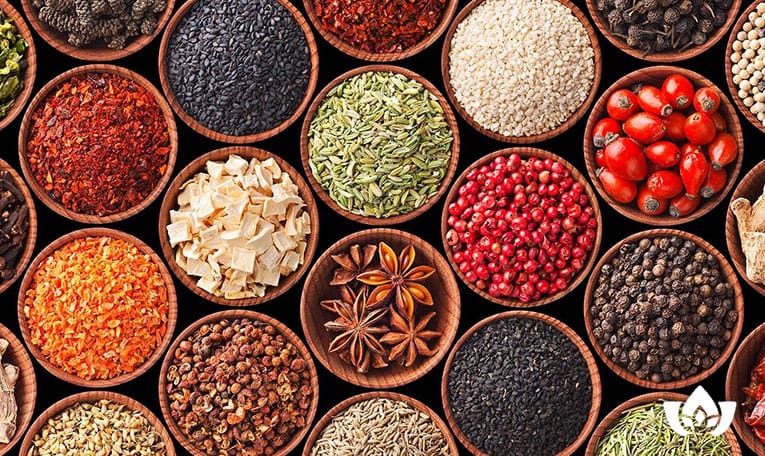 1. Weight Loss
Although there is no “magic-bullet” for weight loss, if shedding some pounds is your goal spicy foods might help.
Some studies suggest that capsaicin, a key compound in chili, can help warm up the body and assist in burning excess calories.
If you're looking for a natural solution for weight loss contact the Mindful Healing Clinic to discuss your options.
2. Anti-Cancer Properties
Capsaicin may also help you reduce your cancer risk.
Research from the American Association for Cancer Research in combination with Harvard University found that capsaicin can kill certain types of cancerous and leukemic
cells.
Turmeric in particular may also slow the growth of cancer cells and tumours.
For the most benefit, pair turmeric with black pepper to help increase absorption.
3. Heart Health
Eating spicy food can be great for your heart.
The effects of LDL (“bad cholesterol”) are lowered by chili peppers, and capsaicin may help with inflammation.
Additionally, red peppers are a great source of vitamins A and C which strengthens the walls of the heart muscles.
The heat of spicy foods can also increase blood flow.
Contact The Mindful Healing Clinic
Want to learn more about how adding some spice to your diet can help you?
Contact me, Dr. Maria Cavallazzi at the Mindful Healing Clinic.
You'll get a chance to sit down with me and talk about your diet, your health concerns, and any other questions you may have about naturopathic medicine.
From there, we can build a plan to help you reap the benefits of adding some spice to your life.
There are some drawbacks to eating spicy food as well, though - hot peppers certainly aren't for everyone.
We'll talk about that more in our next article.
Until next time,
Dr. Maria Cavallazzi, N.D
Mindful Healing Integrative Naturopathy
251 Queen St S Unit 4,
Mississauga, ON L5M 1L7
- https://goo.gl/maps/KYspifT7J232
Dr. Maria Cavallazzi is a medical doctor from Colombia where she practiced as a family physician for 8 years until she moved to Canada 16 years ago.
To find more ideas on health, wellness, and alternative medicine, please visit us here: naturopath benefits
1. Weight Loss
Although there is no “magic-bullet” for weight loss, if shedding some pounds is your goal spicy foods might help.
Some studies suggest that capsaicin, a key compound in chili, can help warm up the body and assist in burning excess calories.
If you're looking for a natural solution for weight loss contact the Mindful Healing Clinic to discuss your options.
2. Anti-Cancer Properties
Capsaicin may also help you reduce your cancer risk.
Research from the American Association for Cancer Research in combination with Harvard University found that capsaicin can kill certain types of cancerous and leukemic
cells.
Turmeric in particular may also slow the growth of cancer cells and tumours.
For the most benefit, pair turmeric with black pepper to help increase absorption.
3. Heart Health
Eating spicy food can be great for your heart.
The effects of LDL (“bad cholesterol”) are lowered by chili peppers, and capsaicin may help with inflammation.
Additionally, red peppers are a great source of vitamins A and C which strengthens the walls of the heart muscles.
The heat of spicy foods can also increase blood flow.
Contact The Mindful Healing Clinic
Want to learn more about how adding some spice to your diet can help you?
Contact me, Dr. Maria Cavallazzi at the Mindful Healing Clinic.
You'll get a chance to sit down with me and talk about your diet, your health concerns, and any other questions you may have about naturopathic medicine.
From there, we can build a plan to help you reap the benefits of adding some spice to your life.
There are some drawbacks to eating spicy food as well, though - hot peppers certainly aren't for everyone.
We'll talk about that more in our next article.
Until next time,
Dr. Maria Cavallazzi, N.D
Mindful Healing Integrative Naturopathy
251 Queen St S Unit 4,
Mississauga, ON L5M 1L7
- https://goo.gl/maps/KYspifT7J232
Dr. Maria Cavallazzi is a medical doctor from Colombia where she practiced as a family physician for 8 years until she moved to Canada 16 years ago.
To find more ideas on health, wellness, and alternative medicine, please visit us here: naturopath benefits
>> Read More
Health Risks From Eating Spicy Food (Sun, 12 Aug 2018)
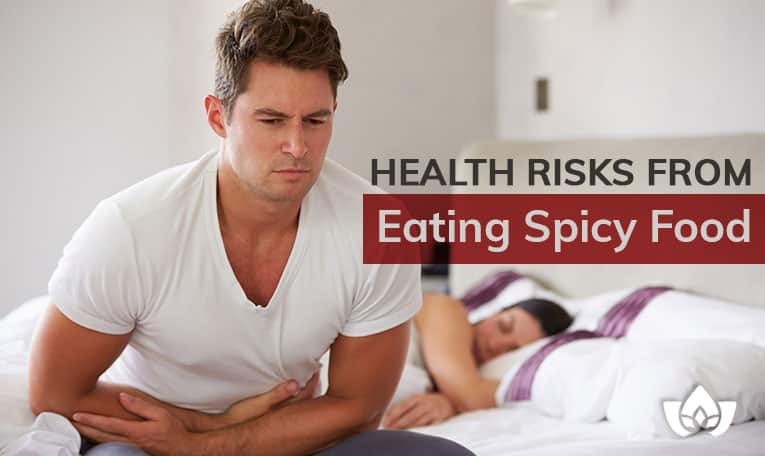 Spicy food, depending on your tolerance, may be something you gravitate towards or avoid completely.
There may be certain health risks from eating spicy food that give reason to take caution.
When it comes to dietary advice on how to approach spicy food, each person is different and your individual needs may vary.
However, there are some common effects and repercussions of eating spicy foods that are fairly well documented.
Keep reading to find out more.
Common Effects Of Eating Spicy Food
Eating spicy food generally involves your mouth and tongue feeling like there is a physical fire on them.
The reason for this is a compound called capsaicin present in spicy food that triggers the same receptors on your taste buds that literal heat does, tricking your brain to thinking that
there is something physically hot in your mouth.
This can cause a variety of symptoms you may be familiar with, depending on the strength of the spicy food consumed, such as:
- Sweating
- Burning sensation on the tongue and mouth
- Stomach discomfort
- Nausea
- Vomiting
However, you'll be glad to know that the spicy food does not actually cause physical damage to your tongue or esophagus upon consumption.
That being said, spicy food still comes with an assortment of other health risks you may not be aware of.
Health Risks Of Eating Spicy Food
Capsaicin can actually be fatal when consumed in large enough quantities because your body views it as a neurotoxin.
However, the odds of this happening are pretty low because your body has mechanisms in place to prevent you from eating enough to cause a fatal reaction.
In fact, the symptoms from eating spicy food are linked with these very mechanisms that stop a fatal dose from being ingested, as well as a few other health risks from the aftermath of
eating spicy food.
Vomiting is one of the body's responses when something ends up in your stomach that shouldn't be there, whether that's too much spicy food, too much alcohol, or a poisonous substance.
Unfortunately, while vomiting clears the stomach of the capsaicin, the acid from the stomach can cause irritation and damage to the esophagus on the way up.
The damage can be exacerbated depending on the level of capsaicin in the food ingested as well.
Capsaicin also causes inflammation of tissue, which can lead to damage in the stomach or intestinal lining in larger doses.
At this point you may be wondering if regular amounts of spicy food also have any health risks; the following outlines just that.
Spicy food, depending on your tolerance, may be something you gravitate towards or avoid completely.
There may be certain health risks from eating spicy food that give reason to take caution.
When it comes to dietary advice on how to approach spicy food, each person is different and your individual needs may vary.
However, there are some common effects and repercussions of eating spicy foods that are fairly well documented.
Keep reading to find out more.
Common Effects Of Eating Spicy Food
Eating spicy food generally involves your mouth and tongue feeling like there is a physical fire on them.
The reason for this is a compound called capsaicin present in spicy food that triggers the same receptors on your taste buds that literal heat does, tricking your brain to thinking that
there is something physically hot in your mouth.
This can cause a variety of symptoms you may be familiar with, depending on the strength of the spicy food consumed, such as:
- Sweating
- Burning sensation on the tongue and mouth
- Stomach discomfort
- Nausea
- Vomiting
However, you'll be glad to know that the spicy food does not actually cause physical damage to your tongue or esophagus upon consumption.
That being said, spicy food still comes with an assortment of other health risks you may not be aware of.
Health Risks Of Eating Spicy Food
Capsaicin can actually be fatal when consumed in large enough quantities because your body views it as a neurotoxin.
However, the odds of this happening are pretty low because your body has mechanisms in place to prevent you from eating enough to cause a fatal reaction.
In fact, the symptoms from eating spicy food are linked with these very mechanisms that stop a fatal dose from being ingested, as well as a few other health risks from the aftermath of
eating spicy food.
Vomiting is one of the body's responses when something ends up in your stomach that shouldn't be there, whether that's too much spicy food, too much alcohol, or a poisonous substance.
Unfortunately, while vomiting clears the stomach of the capsaicin, the acid from the stomach can cause irritation and damage to the esophagus on the way up.
The damage can be exacerbated depending on the level of capsaicin in the food ingested as well.
Capsaicin also causes inflammation of tissue, which can lead to damage in the stomach or intestinal lining in larger doses.
At this point you may be wondering if regular amounts of spicy food also have any health risks; the following outlines just that.
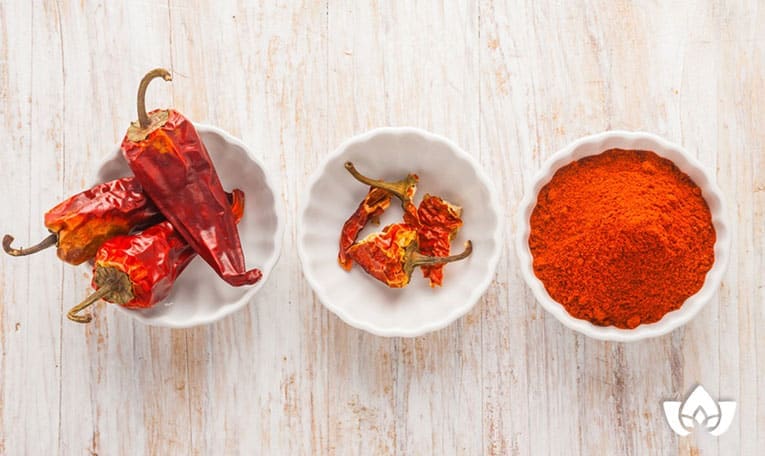 1. It Can Trigger IBS Symptoms
One study exploring the link between spicy food and irritable bowel syndrome found that a greater
consumption of spicy foods was associated with a higher likelihood of having IBS.
On top of that, regular symptoms of IBS can be exacerbated from spicy food ingestion by causing more stomach irritation and diarrhea.
2. It Can Be Painful If You Have Geographic Tongue
In case you don't know, geographic tongue is a condition where the tongue has patches that seem irregular, smooth, and red.
The name of the condition, formally known as benign migratory glossitis and erythema migrans, comes from the fact these patches show up like parts of a map on your tongue.
The cause of geographic tongue is currently unknown, and it isn't clear if eating spicy food is linked with the beginning of this disorder.
However, individuals with geographic tongue can be more sensitive to spicy foods, making its consumption a painful experience.
3. It Can Trigger Heartburn
Similarly to geographic tongue, spicy foods may not be the cause of heartburn, but can make an existing condition worse.
As mentioned earlier in the article, because capsaicin acts as an irritant to your insides, consuming spicy food can make acid reflux more painful and longer lasting than it normally
would.
Contact The Mindful Healing Clinic
If you have any additional concerns in regards to your diet and spicy food, we can help here at the Mindful Healing Clinic.
We provide a full-range of naturopathic services provided by a physician and licensed naturopathic doctor such as, but not limited to:
- Clinical nutrition
- Botanical medicine
- Traditional Chinese medicine
Here at the Mindful Healing Clinic, we concentrate on the whole person, rather than focusing only on symptomatic treatment, so if eating spicy food is triggering symptoms, we'll work
toward helping you understand why.
Contact the Mindful Healing Clinic to book your FREE 15-minute introductory session today.
Until next time,
Dr. Maria Cavallazzi, N.D
Mindful Healing Integrative Naturopathy
251 Queen St S Unit 4,
Mississauga, ON L5M 1L7
- https://goo.gl/maps/KYspifT7J232
Dr. Maria Cavallazzi is a medical doctor from Colombia where she practiced as a family physician for 8 years until she moved to Canada 16 years ago.
To discover more information about health, wellness, and alternative medicine, please visit us here:
naturopath in Mississauga
1. It Can Trigger IBS Symptoms
One study exploring the link between spicy food and irritable bowel syndrome found that a greater
consumption of spicy foods was associated with a higher likelihood of having IBS.
On top of that, regular symptoms of IBS can be exacerbated from spicy food ingestion by causing more stomach irritation and diarrhea.
2. It Can Be Painful If You Have Geographic Tongue
In case you don't know, geographic tongue is a condition where the tongue has patches that seem irregular, smooth, and red.
The name of the condition, formally known as benign migratory glossitis and erythema migrans, comes from the fact these patches show up like parts of a map on your tongue.
The cause of geographic tongue is currently unknown, and it isn't clear if eating spicy food is linked with the beginning of this disorder.
However, individuals with geographic tongue can be more sensitive to spicy foods, making its consumption a painful experience.
3. It Can Trigger Heartburn
Similarly to geographic tongue, spicy foods may not be the cause of heartburn, but can make an existing condition worse.
As mentioned earlier in the article, because capsaicin acts as an irritant to your insides, consuming spicy food can make acid reflux more painful and longer lasting than it normally
would.
Contact The Mindful Healing Clinic
If you have any additional concerns in regards to your diet and spicy food, we can help here at the Mindful Healing Clinic.
We provide a full-range of naturopathic services provided by a physician and licensed naturopathic doctor such as, but not limited to:
- Clinical nutrition
- Botanical medicine
- Traditional Chinese medicine
Here at the Mindful Healing Clinic, we concentrate on the whole person, rather than focusing only on symptomatic treatment, so if eating spicy food is triggering symptoms, we'll work
toward helping you understand why.
Contact the Mindful Healing Clinic to book your FREE 15-minute introductory session today.
Until next time,
Dr. Maria Cavallazzi, N.D
Mindful Healing Integrative Naturopathy
251 Queen St S Unit 4,
Mississauga, ON L5M 1L7
- https://goo.gl/maps/KYspifT7J232
Dr. Maria Cavallazzi is a medical doctor from Colombia where she practiced as a family physician for 8 years until she moved to Canada 16 years ago.
To discover more information about health, wellness, and alternative medicine, please visit us here:
naturopath in Mississauga
>> Read More